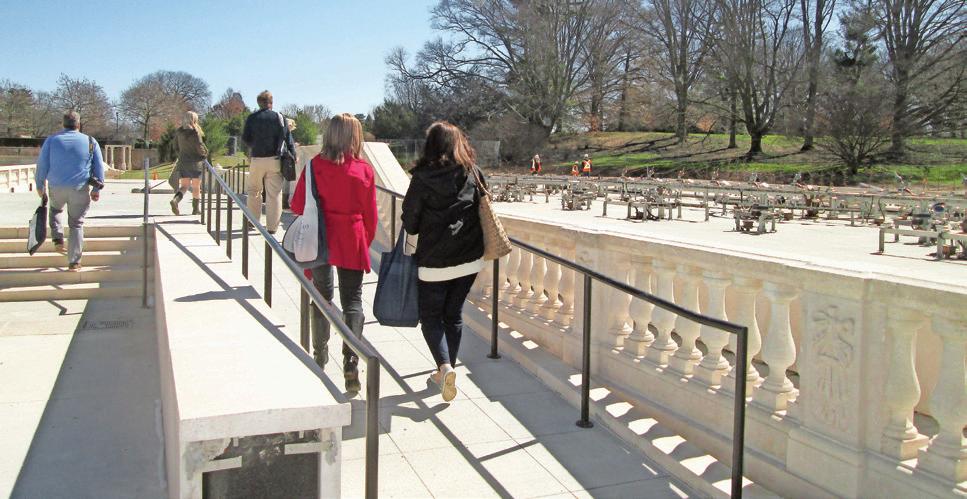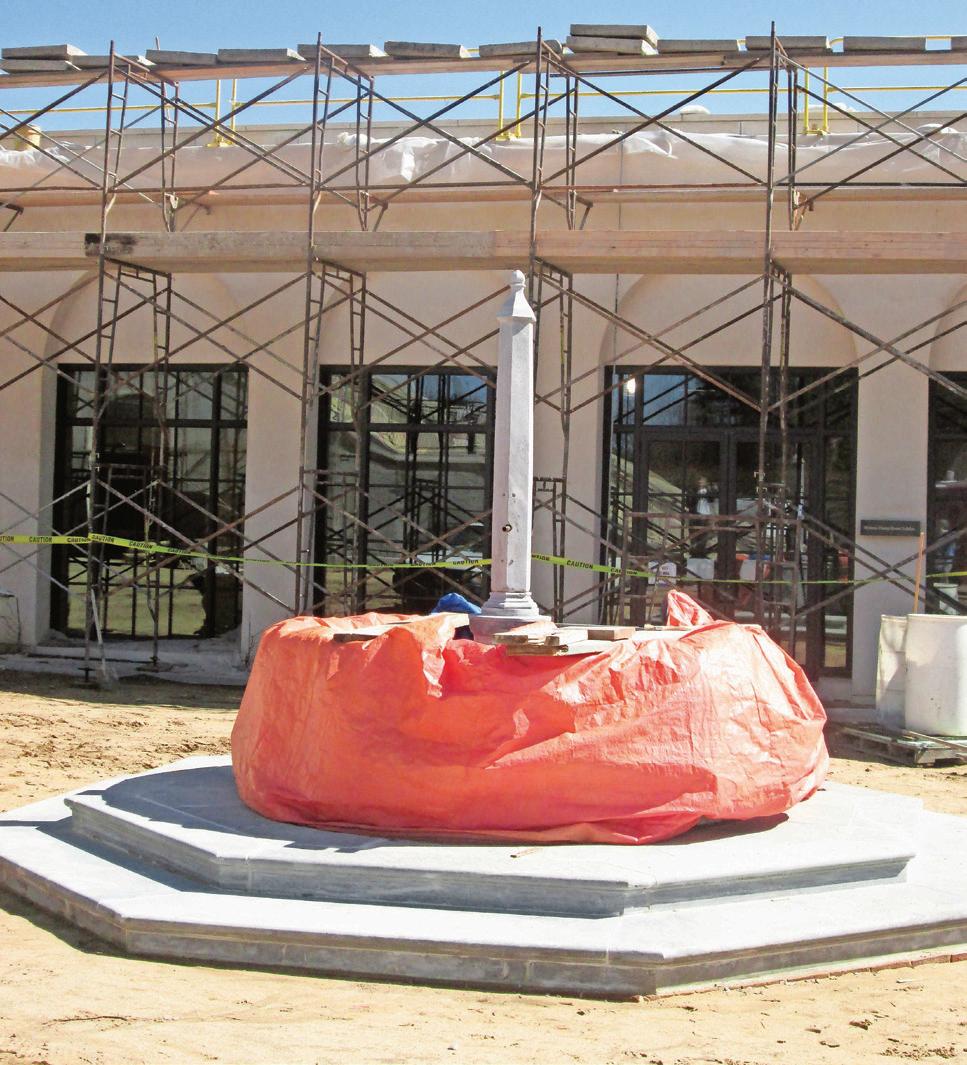The fountains dance again at Longwood

After a $90 million makeover, the fountain shows will return to Longwood Gardens this summer, with some spectacular new effects and plenty of behindthe-scenes engineering upgrades. See story on Page 1B.


After a $90 million makeover, the fountain shows will return to Longwood Gardens this summer, with some spectacular new effects and plenty of behindthe-scenes engineering upgrades. See story on Page 1B.
By Richard L. Gaw Staff Writer
Since its inception a few years ago, the 16-member Route 1 Economic Development Steering Committee has been identifying its initiatives as a “marketing tool” that local townships and municipalities can use for attracting potential economic growth to their communities.
Among those ideas has
been the development of a website, specifically targeted to prospective business leaders who are considering the idea of locating along the corridor.
On March 28 at the Technical College High School’s Pennock Bridge (TCHS) campus, the committee met over lunch to see the roll out of its official website, which was presented by TCHS senior
Continued on Page 3A
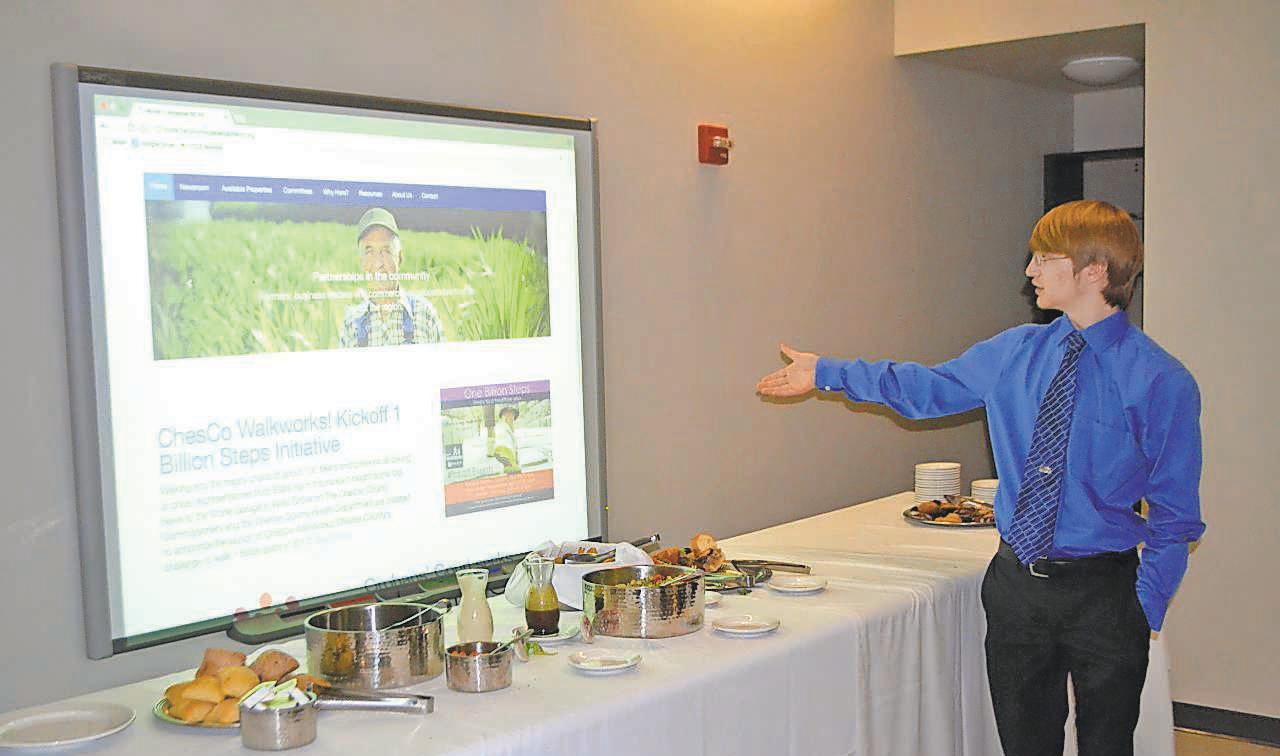
By Steven Hoffman Staff Writer
Bill Holdsworth was sworn in as the new chief of police of Kennett Square Borough on Monday night, concluding a six-month search process to fill the vacancy.
Holdsworth, who has spent most of his 20-year law enforcement career with the Kennett Square Police Department, has served as the Officer in Charge since July of 2016. He was selected as the new police chief after an
Continued on Page 9A
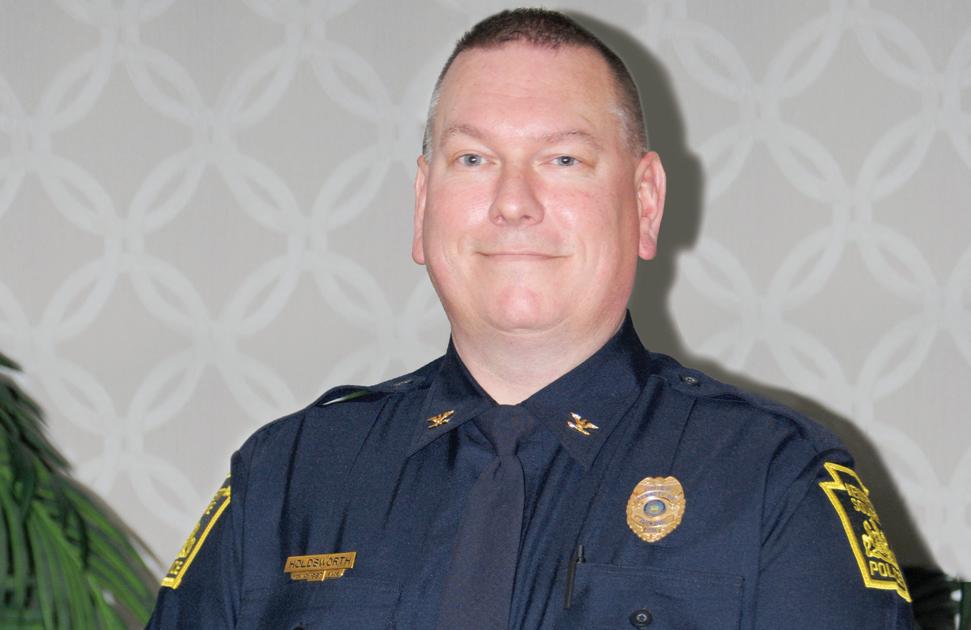
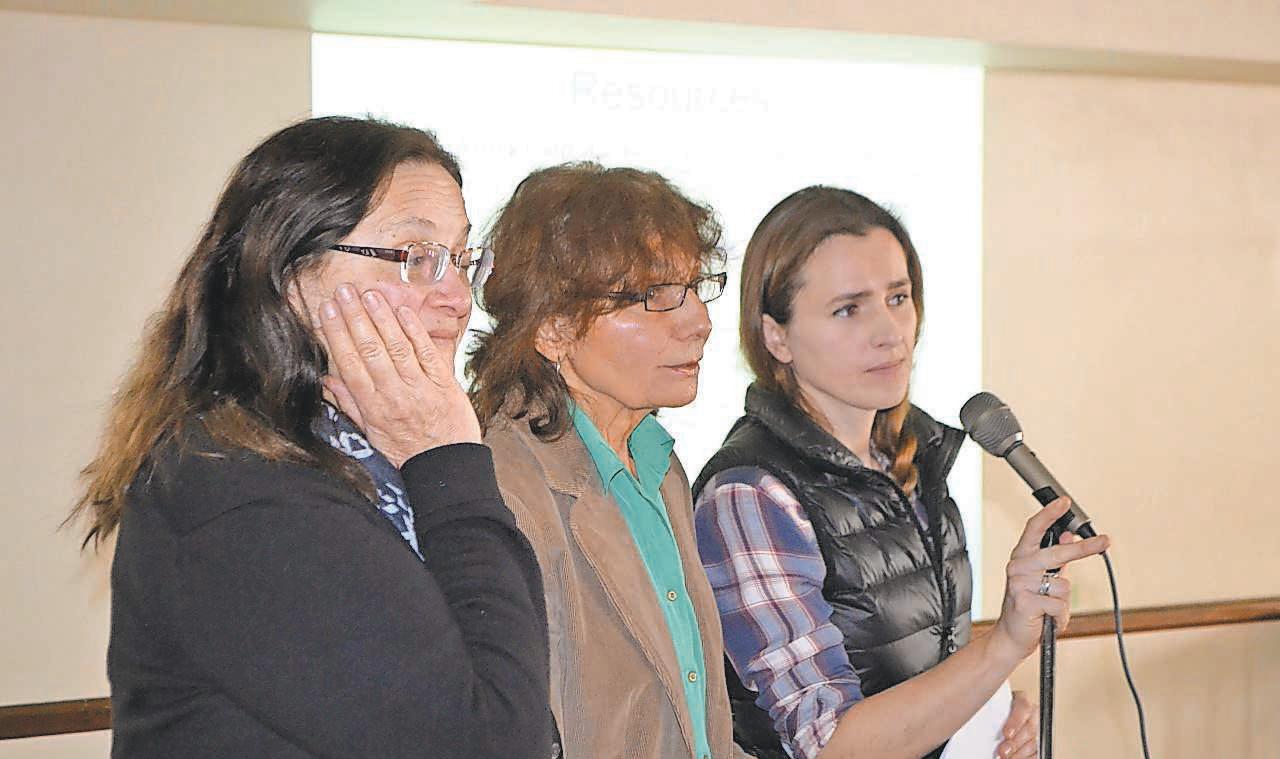
By Richard L. Gaw Staff Writer
Indivisible KSQ, the grass roots group that has galvanized in recent months on the strength of its support of immigrant rights in the Southern Chester County Hispanic community, took another bold step last Saturday morning when it stepped up its efforts to
get information into the hands of the local Hispanic population that gives them advice and counsel about what to do when facing deportation.
Before an audience of 100 at the Kennett Friends Meeting House, Diana Rarig, Karen D’Agusto and Maja Murphy of Indivisible KSQ’s Legal Committee gave a presentation that
focused on five needs for the local Hispanic population: finding additional notaries, which are required by Pennsylvania law, in addition to two witnesses for power-of-attorney; developing a handout for those who deal with Immigration and Customs Enforcement (ICE); providing the community with information
Continued on Page 3A
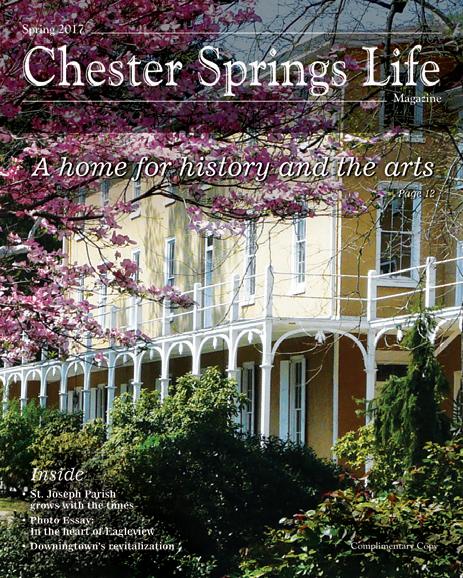
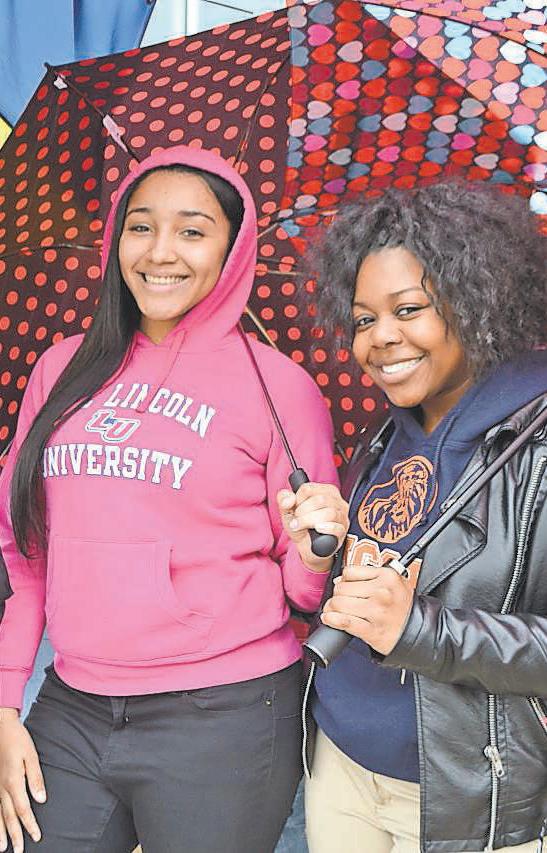



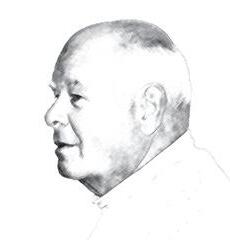
By Uncle Irvin
By John Chambless Staff Writer
The fate of the United States of America hung in the balance in 1777, and the men who fought and died in Chester County played a pivotal role in whether the 13 colonies would survive. On March 30 at the Radley Run Country Club, in the heart of the area where British and Colonial troops once clashed, a large group of people dedicated to preserving the memory of the American Revolution heard about a big step forward for their cause.
Scott Stephenson spoke at the annual meeting of the Brandywine Battlefield Task Force, offering an overview of the soonto-open Museum of the
American Revolution in Philadelphia. Stephenson, who lives in Landenberg, is the vice-president of collections, exhibitions and programming for the museum, which opens on April 19 in the heart of the city’s historic district, near Independence Hall.
“This is one of the greatest parts of America to live in,” Stephenson told the audience, “and I feel privileged to live here.”
The Museum of the American Revolution has been a decade in the making, he said, and expectations are running high, with 30,000 advance tickets already sold for 2017.
“Hang on, because a lot of those people will also want to visit this area, to see where the events actually
took place,” Stephenson said. In his illustrated presentation, Stephenson traced the history of George Washington’s battlefield tents, and how, despite the odds, two have survived. The new museum will exhibit one of them in a
theater of its own beginning on April 19.
But the museum also holds a rich variety of weapons, artifacts, printed works and manuscripts from the Revolutionary War, displayed with an eye toward immersing visitors in the
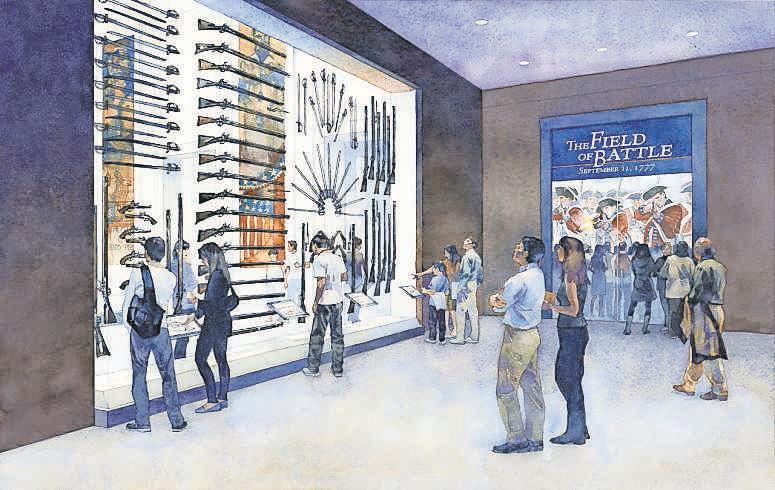
era. “You can’t just put teacups on a shelf anymore and expect people to get excited about it,” Stephenson said.
Visitors will be asked to consider some themes during their visit, he said.
“How do people become revolutionaries? How truly revolutionary was this war?
And what kind of nation did the revolutionaries create?” Stephenson said.
The museum has 16,000 square feet of core exhibition space, with the experience divided into 16 galleries or theaters. While Stephenson said “there are a lot of guns in the museum, it’s not a military museum.
We’re telling the story of the creation of the republic, and we want visitors to think about this experiment in self-government.”
Toward that end, there is
a surround-sound movie theater where visitors will be placed in the midst of battles that were staged by re-enactors at the Cheslyn Preserve, as close to a historically accurate landscape as possible, Stephenson said. “There will be the smell of smoke, and the floor will shake,” he said.
Visitors can climb aboard a recreated Philadelphia Privateer boat, use touch screens to examine artifacts in ultra-high-definition video, and walk through a town square. Groups will be assigned the names of real people who lived during the Revolutionary War, learning what happened to their character when the tour is over.
“We want to make the point that this is not just a story set in the past,” Stephenson said. “When people are leaving, there’s
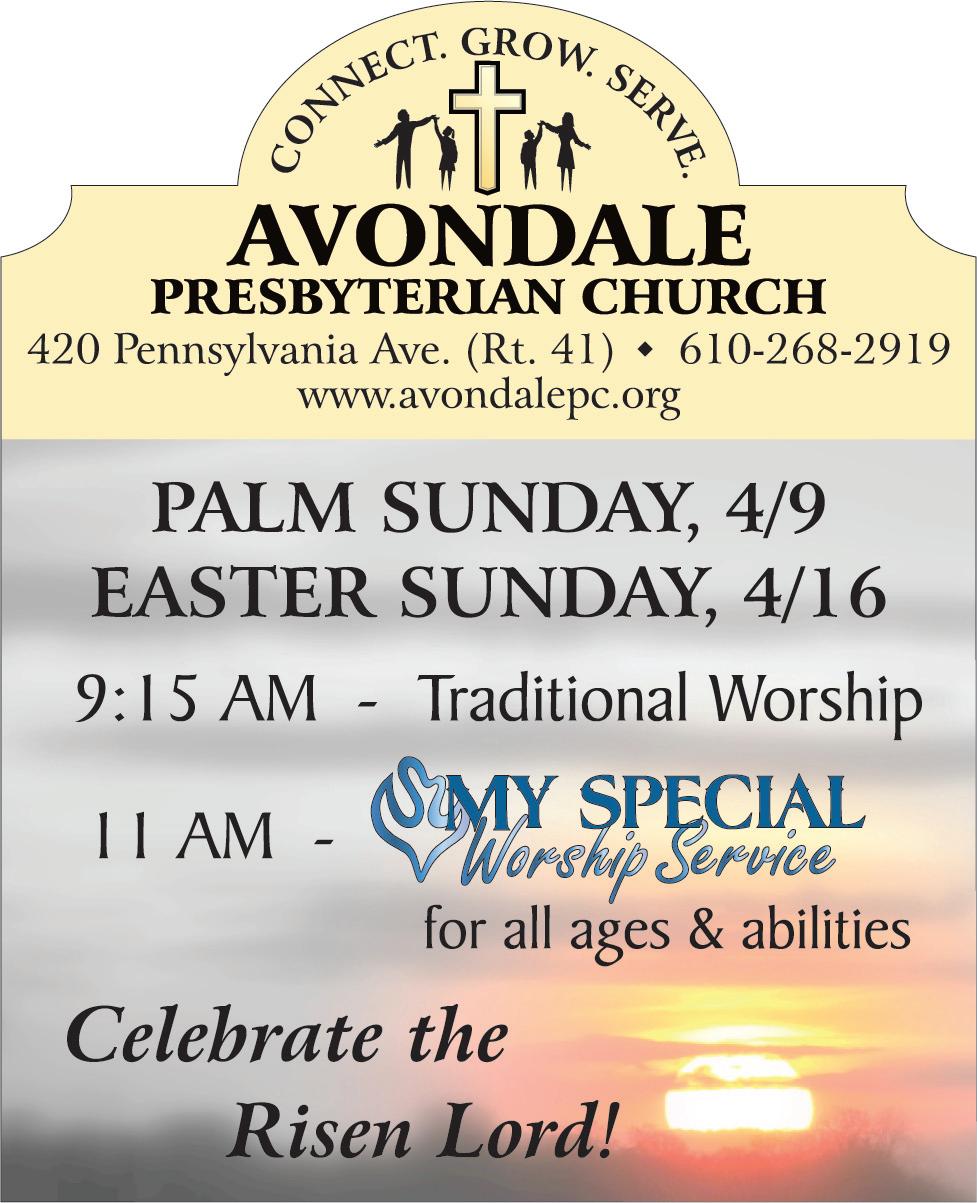
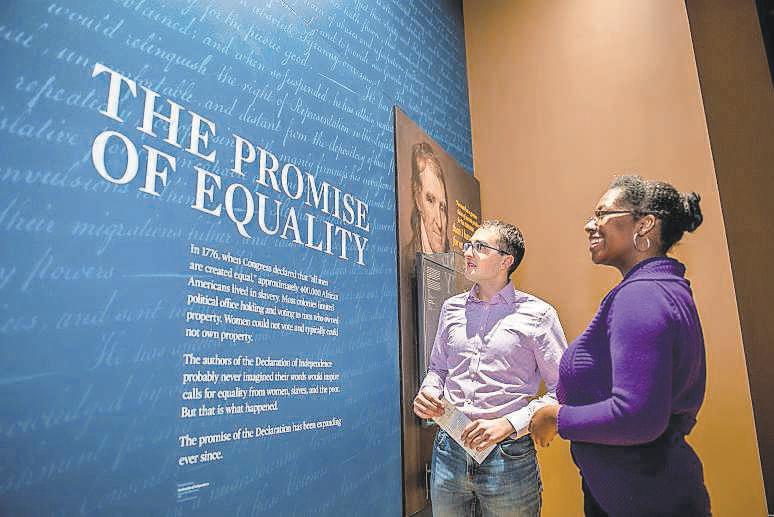
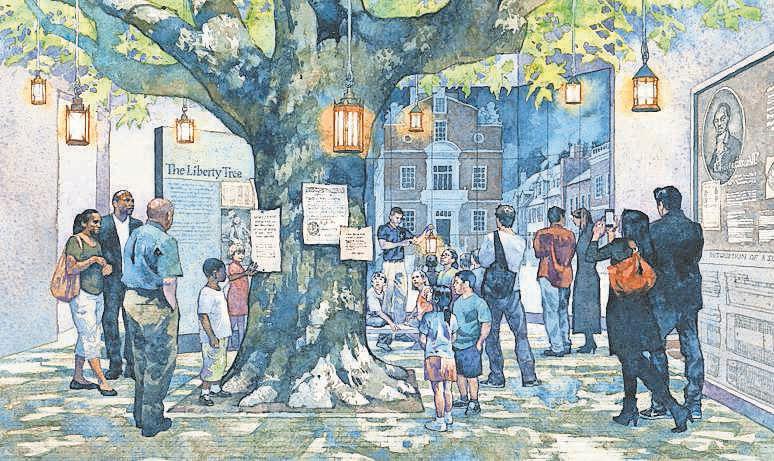
a wall of photographs of 74 people who lived during the Revolution and lived long enough to have their photograph taken. You can look into the eyes of these people, and at the end, you feel like you’re swimming in the same stream of history.”
With battlefield sites so close to Philadelphia, there will be an effort to link visitors to places like the Brandywine Battlefield.
“We’re going to be bringing museum guides to Chadds Ford to show them what’s available to visitors here,” Stephenson said, “as well as to Washington’s Crossing and Valley Forge. The best marketing is word of mouth. We think we’ve dropped a line into 2 to 3 million

people who will want to see more, and we want to ramp up that interest.”
The Museum of the American Revolution is at 101 South Third Street in Philadelphia. Visit www. AmRevMuseum.org for more information, or to purchase tickets.
The first part of the meeting on March 30 detailed the accomplishments and future plans of the Task Force, which is in the midst of a Strategic Landscapes project that is trying to highlight significant areas of the Brandywine Battlefield. A major challenge has been the sheer size of the historic area – some 35,000 acres in 15 municipalities and two counties.
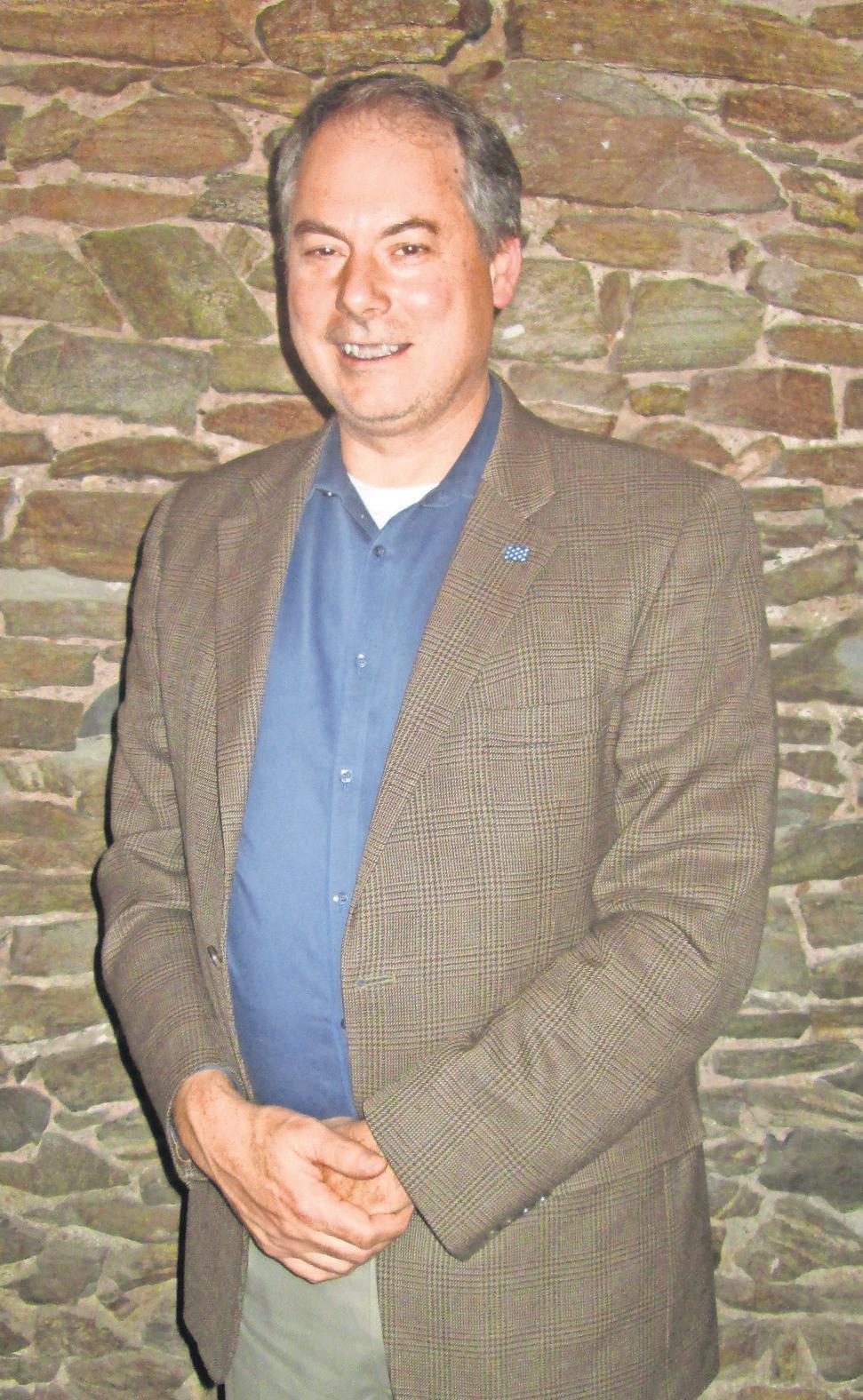
The Battle of Brandywine was one of the largest single-day land battles and involved the most troops in active combat of any battle in the Revolution.
The Strategic Landscapes planning, being undertaken by the Chester County Planning Commission, is now focusing on the southern battlefield, where the Crown Forces camped the night of Sept. 10, 1777 and marched in two columns the following morning from today’s Kennett Square Borough and New Garden and Kennett townships,
through East Marlborough and Pennsbury townships, to attack the American Army positioned along the Brandywine Creek. Project funding is coming from the National Parks Service’s American Battlefield Protection Program and in-kind support by Chester County Planning Commission.
This summer, there will be a series of tours that highlight the campaign of 1777. “Town Tours and Village Walks” is a series of free strolls through historic neighborhoods, villages and


significant sites from June 16 through Aug. 25. Tours last about 50 minutes, and begin at 7 p.m. The tour schedule is: June 15 – “The Land of Goshen 1777, From Turk’s Head to County Seat,” with a kick-off celebration at the Chester County Historical Society; June 22 – “Two Days Before Brandywine: September 9-11” in Kennett Borough; June 29 – “The British Flank at Trimbles Ford – An Archaeological Journey”; July 4 – A special observation at the Revolutionary War Soldiers Cemetery; July 6 – “Witness to Battle: Two Armies Clash on the Farm Fields of Birmingham”; July 13 – Bus tour (reservations required) for “Advance With the Hessians”; July 20 – “West Whiteland’s Role in the Revolutionary War”; July 27 – “Remains of the Day and the Retreat From the Battle of the Clouds”; Aug. 3 – “Revolutionary Era Powder Mills and More”; Aug. 10 – Sept. 20, 1777 – Remember Paoli”; Aug. 17 – Self-guided driving tours, “The Furnace Region During the Revolutionary War”; Aug. 24 – “Walking With Washington, Literally!”
The schedule is still being finalized. Visit www.chesco.org/planning/towntours for updated information.
To contact Staff Writer John Chambless, email jchambless@chestercounty. com.
Continued from Page 1A
Vince Di Giacomo, who designed the site under the guidance of TCHS teacher Phillip Fuchs. The interactive and informative site – www. route1economicdevelopment.org – includes several colorful splash pages filled with photographs, and a full menu of headers that point visitors to available properties along the corridor; a list of local resources; a “newsroom” that includes the latest news about the corridor; a list of subcommittees; and a Why Here? page, that provides a broad overview of Southern Chester County and a list of the businesses that have incorporated along Route 1. The committee also discussed its proposed preamble and mission statement. The proposed preamble reads: “The men and women who make up the Steering Committee of the Route 1 Economic

Continued from Page 1A
when they are taken into custody; finding additional sources of financial assistance to help pay for bonds after being arrested; and filling a need for more assistance to those who assume power of attorney of children if the children’s parents are deported.
Working from an existing manual it found on the website of the Archdiocese of Los Angeles entitled “Preparing Your Family for Immigration Enforcement,” the committee plans to develop a similar manual, applicable to Pennsylvania laws, that it will share with La Communidad Hispana in Kennett Square, St. Rocco in Avondale, and at stores and businesses frequented by members of the Hispanic community.
The committee has also developed 500 laminated “rights” cards that its volunteers plan to distribute throughout the local Hispanic communities, which individuals and fam-
ily members can give to ICE officials when they are approached by them. Written in both English and Spanish, the card reads: “I am giving you this card because I do not wish to speak to you or have any further contact with you. I choose to exercise my right to remain silent and refuse to answer your questions. If you arrest me, I will continue to exercise my right to remain silent and refuse to answer your questions. I want to speak to a lawyer before answering your questions.”
The card also directs the card holder to the names and phone numbers of immigration attorneys Lindsey Sweet and Katelyn Hufe. The committee is looking to print an additional 500 cards for distribution.
Rarig said the committee recently met with Sweet to discuss the possibility of establishing an account that those who are detained may be able to access in the event that they are arrested by ICE officials. The cost of paying these bonds fluctu-
ates; an individual who does not have a criminal record can expect to pay a bond in the amount of $1,500, and if they have a criminal record, the amount of that bond can cost up to $20,000. Until they pay that bond, they are still incarcerated, often as far away as York, Philadelphia, Northern Pennsylvania or Ohio.
“The dilemma in this is that they are not with their families, they’re not working, so we came up with the idea to ask for donations to set up an account, to allow individuals to borrow money from the account, in order to pay the bond and get back home,” Rarig said. The whole purpose of the account, she said, is to allow individuals to get back to their families as soon as possible.
The committee also addressed what to do with children who are left behind if both parents are detained or deported. Much of this work, the committee found, is currently being done by La Communidad Hispana and the Mexican Consulate
Dylan’s Desserts, a gourmet dessert shop, is open at The Market at Liberty Place.
Dylan’s Desserts offers more than 20 flavors of Woodside Creamery Ice Cream, with specialty sundaes as well as cookies and cheesecake. Water ice and ice cream floats will be served at Dylan’s soon. Open until 9 p.m. every
Development Initiative of Southern Chester County endeavor to support the goals of the municipalities and businesses situated along the Route 1 Corridor, and to be of service to the communities that seek economic and growth development.”
The committee’s proposed mission statement reads: “The Route 1 Corridor business community of Southern Chester County envisions a region that works together to provide opportunities for its citizens and expand the region’s tax base and diversity, thereby stabilizing taxes, creating attractive destinations for commerce and development; protecting our
evening except Sunday and Monday (7 p.m. closing Sunday and closed on Monday), Dylan’s Desserts will be open until 9 every day of the week as summer approaches.
“I’m very excited to bring Woodside Creamery Ice Cream to both Kennett Square and The Market at Liberty Place. The feedback
agricultural base and conserving the picturesque landscapes, and building on a sense-of-place as a leading and healthy region and excellent place to live, work and stay.
“Through voluntary conversations with and among municipalities along the Route 1 Corridor, as stewards we promote quality of life in concurrence with preservation, selective economic development, and smart growth development.”
Additional reports were given by land development and municipal sub-committee chair Dennis Melton; infrastructure sub-committee chair Bill Hostetter; economic development
from our customers has been tremendous and very exciting,” said owner and operator Sam Hamdan.
Dylan’s Desserts can be reached at 302-528-2454.
Dylan’s Desserts is one of eight merchants located in The Liberty Place at Kennett Square (148 W. State St., Kennett Square). Visit www. themarketatlibertyplace.com.
sub-committee chair Bob Norris; housing sub-committee chair Daria Payne and land preservation and open space sub-committee chair Peter Kjellerup.
The Southern Chester County Chamber of Commerce will be hosting “Outlook 2017: Southern Chester County Municipalities Update Along the Route 1 Corridor” on June 8, from 11 a.m. to 1:30 p.m. at the chamber’s offices on 8 Federal Road in West
Pennsylvania Immigration Resource Center: www. pirclaw.org/resources/individuals
Chester County Bar Association: www.chescobar. org
Pennsylvania Immigrant Citizenship Coalition (PICC): http://paimmigrant.org
Sweet and Paciorek, LLC, immigration law: www. sweetpaciorek.com
Gian-Grasso, Tomczak & Hufe, immigration law: www.gthpc.com
Notifica.us: An application for a smart phone or phone of a family member to send an immediate message to a support group in case of emergency.
Source: Indivisible KSQ’s Legal Committee in Philadelphia.
The committee also compiled a list of legal resources that it plans to get to the Hispanic community. (See “Legal Resources for Hispanic Community.”)

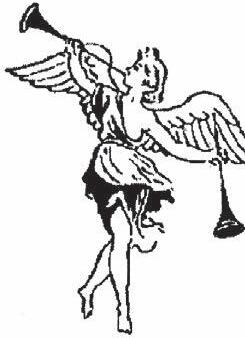
Indivisible KSQ’s next meeting will be held on April 15, beginning at 9:30 a.m. at the Kennett Friends Meeting House. Sweet is scheduled to speak about legal rights for immigrants. Spanish translation and child care will be provided.
To contact Staff Writer Richard L. Gaw, e-mail rgaw@chestercounty.com.

Lizzie S. Lapp and Jonas K. Lapp of Oxford have announced the birth of a son on March 15 at the Heart of Lancaster Regional Medical Center.

Grove. The luncheon will invite representatives from 13 municipalities whose boundaries back up to the corridor to give updates on economic current initiatives, and proposed projects, in their respective districts.
To contact Staff Writer Richard L. Gaw, e-mail rgaw@chestercounty.com.
Those municipalities on the invitation list will be the townships of East Marlborough, East Nottingham, Kennett, London Grove, Lower Oxford, New Garden, Oxford, Penn, Pennsbury and Upper Oxford; and West Grove Borough, Avondale Borough, and the Borough of Kennett Square.


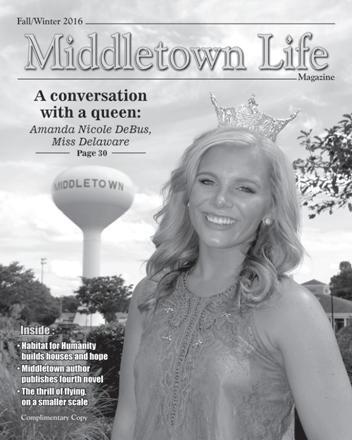
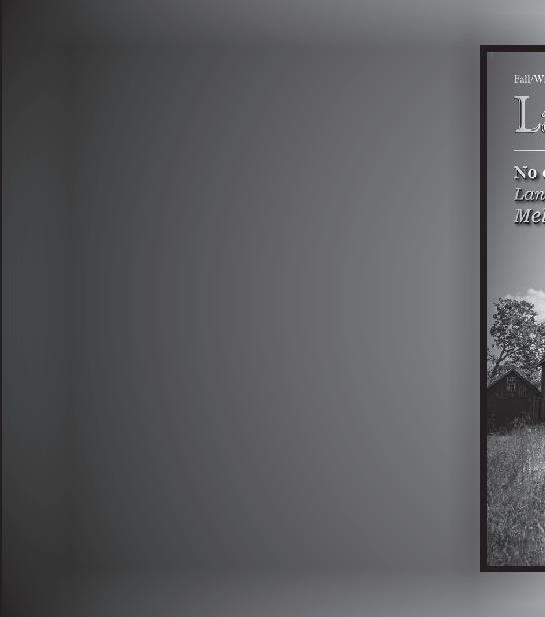
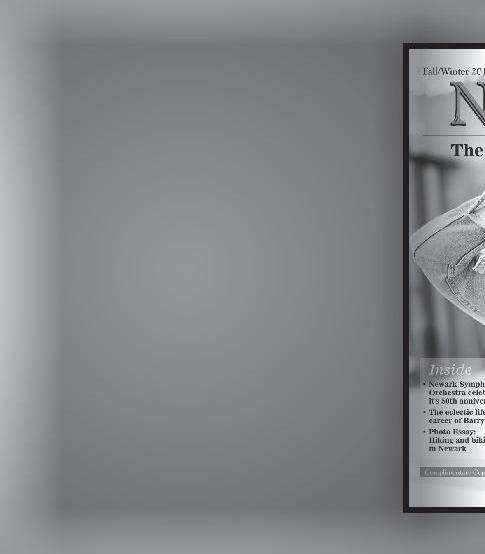
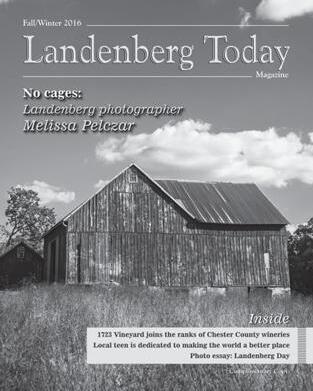

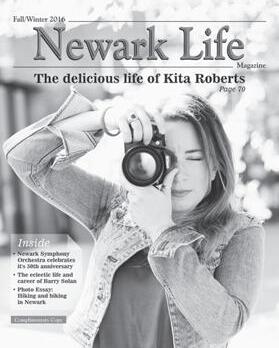

By Steven Hoffman Staff Writer
Trevor Sikorski, a thirdgrader at the Avon Grove Intermediate School, earned a sixth-place finish in the national finals of the Drive, Chip & Putt competition that took place last weekend. He and 80 other young golfers from across the country had the opportunity to compete in the finals at the prestigious Augusta National Golf Club just days before the start of the Masters Golf Tournament.
Sikorski was competing in the boys’ age 7 through 9 division after qualifying
for a spot in the national finals with a second place finish in the local qualifier tournament at the White Clay Creek Country Club in Delaware, and a first place finish in sub-regionals at the ACE Club near Philadelphia. He also had a first-place performance in the regionals at Baltusrol Golf Club in New Jersey. Those qualifiers took place throughout the summer and fall of 2016.
The Drive, Chip & Putt Tournament is a free junior golf development competition that focuses on the three fundamental skills of golf. The competition was started
three years ago as a way to inspire the next generation of golfers to take up the sport.
Tens of thousands of youngsters had the opportunity to qualify for the finals as competitions took place on more than 250 golf courses in all 50 states. At the conclusion of the tournament, eight junior golfers—four boys and four girls—were crowned as champions of the Drive, Chip and Putt competition. This year’s champions are Carter Gaede of Manhattan Beach, California (age 7 to 9 division); Liam Hartling of Redlands, California (age 10 to 11);
Zachary Colon of Bolton, Massachusetts (age 12 and 13); Mason Quagliata of Scottsdale, Arizona (age 14 and 15); Maye Huang of Katy, Texas (age 7 to 9); Lucy Yuan of San Diego, California (age 10 and 11); Alexa Pano of Lake Worth, Florida (age 12 and 13); and Savannah Grewal of Mississauga, Ontario (age 14 and 15).
For more information about the Drive, Chip and Putt competition or to register for the 2018 competition, visit www. drivechipandputt.com.
To contact Staff Writer Steven Hoffman, email editor@chestercounty. com.

By Steven Hoffman Staff Writer
A public meeting for Oxford Borough officials to outline plans for a proposed parking garage and transportation center project will take place on Tuesday, April 11. Attendees will also have the opportunity to ask questions and share opinions with officials. The meeting will take place at 7 p.m. at the Ware Chapel on the campus of the Ware Presbyterian Village. Oxford Borough Council president Ron Hershey
described the public forum as an informational meeting when council discussed it last month.
A parking garage has been touted as a way to encourage economic development in Oxford’s business district. The lack of available, convenient parking has hindered the town’s efforts to attract a larger employer or anchor business to the downtown district. A 2015 parking study recommended the construction of a 377-space parking garage to address the borough’s long-term parking needs, the most recent of several parking studies to reach
a similar conclusion. Over time, the project has evolved to include a transportation center that would boost the access to public transportation for residents and workers in town.
Oxford has secured two significant grants—one through the Chester County Community Revitalization Program and another through the Pennsylvania Department of Community and Economic Development Multimodal Transportation Fund—that total more than $1 million so far. Borough officials expect more

grant funding to be available as they move toward making a decision about whether they should move forward with the project.
The project now could include a new administration building for the borough. There would be significant savings on design and construction costs by including the new administration building as part of a larger project. The borough
was gifted more than $1 million for a new borough hall by the anonymous donor who, for years, provided gifts for expenditures that the borough wouldn’t be able to afford on its own.
The project, with the parking garage, transportation center, and new administration building included in the designs, is projected to cost about $7.2 million. A major focus of the
April 11 public meeting will likely be whether the borough can secure the rest of the funding for the project without having to raise taxes on residents. More information about the project is available on the Oxford Mainstreet, Inc. website at www.downtownoxfordpa. org.
To contact Staff Writer Steven Hoffman, email editor@ chestercounty.com.
By John Chambless Staff Writer
Six years ago, Cyndi Yurkovich just wanted to help make Franklin Township a cleaner place. On April 22, she’s asking again for community support to help clean up trash and debris along the township’s roads, and there’s a big push to get the word out.
“Last year we had more youth participants than in years past,” Yurkovich wrote last week in an email to the Chester County Press. “These teenage kids were looking for community service hours. We were thrilled to have them, and the township provides a letter of participation to these kids; however, adult and family participation has lagged.”
Advance sign-up isn’t required, she said. “It’s always nice to know how many people are attending, but people can just show up. We will have assignments, but if people have
identified an area that they would like to clean up, they are welcome to do that. We are hoping that subdivisions will want to clean up their developments and the roads surrounding them.”
All ages can participate, she said. “We prefer that young children are not on main roads unless they are in a large group who have identified a traffic watch person to be alert for cars,” Yurkovich added. “The event runs from 8 a.m. to noon. People can participate as long as they’d like. One hour, two hours – the entire time – any contribution of time and energy makes a difference.”
Board of Supervisors member Penny Schenk has been helping organize this year’s event, and wrote last week that, “the township supplies safety vests, gloves, trash bags, and bottled water. These items will be available for pick-up the week prior to the cleanup, and



also the morning of the cleanup at the Township Building.
“I would suggest that anyone who wishes to participate with younger children do so in one of the township preserves or the park, for safety reasons,” Schenk added. “We also have dirt and gravel roads in the township that would be suitable for supervised younger volunteers. Filled bags can either be brought back to the Township Building and placed in the dump truck provided, or the volunteers can leave the bags in a pile along the roadside and notify the township of the location, and a pickup truck will be sent out to collect them.
“Last year, my neighborhood cleaned our road as a group,” Schenk wrote. “It was a great opportunity to spend time together, catch up with each other, and do something good for the community.”
The benefits of the cleanup go beyond making the township more attractive, Yurkovich said.
“At the start of the cleanup, participants have an enormous sense of community spirit – they are excited to begin and make their mark,” she wrote. “After every event, the participants have an enormous sense of community pride because they are the ones responsible for making the township trash-free and beautiful. The younger participants are especially excited about their contribution to the community and have a strong sense of accomplishment. And we also feel that good deeds are contagious. Maybe the community cleanup will inspire kids and adults to continue on and clean up somewhere else that needs it.”
The Franklin Township cleanup will be held April 22 from 8 a.m. to noon (rain date April 23). For information, visit the township website at www. franklintownship.us. To contact Staff Writer John Chambless, email jchambless@ chestercounty.com.
By John Chambless Staff Writer
The April 3 meeting of the East Marlborough Board of Supervisors started with the marking of a milestone for a 40-year employee of the township.
Dennis Mellinger, who started as a laborer for the roads department in 1977 and ended his career as township roadmaster, was recognized by board chairman Richard Hannum, who read a proclamation from Rep. Eric Roe thanking Mellinger for his long record of service. He will retire on March 17. Mellinger thanked the crews who have worked with him over the years as the audience and the board applauded him.
During public comment, Shelley Mentzer presented the board with information about Pennsylvania Act 172, which spells out tax incentives for those who volunteer as emergency workers. The act has been adopted by several local townships. Hannum thanked her for the information and said the board will study the proposal.
Representatives from the Tough Mudder run, slated May 20 and 21 at Willowdale, presented their plans for the two-day event to the board. There will be an overnight component to the race this year, with a
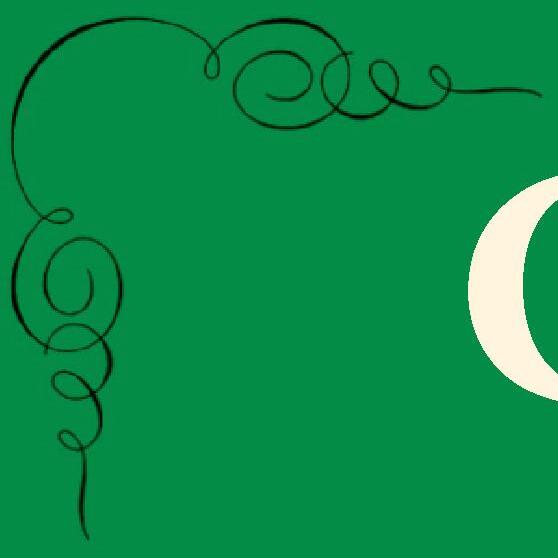
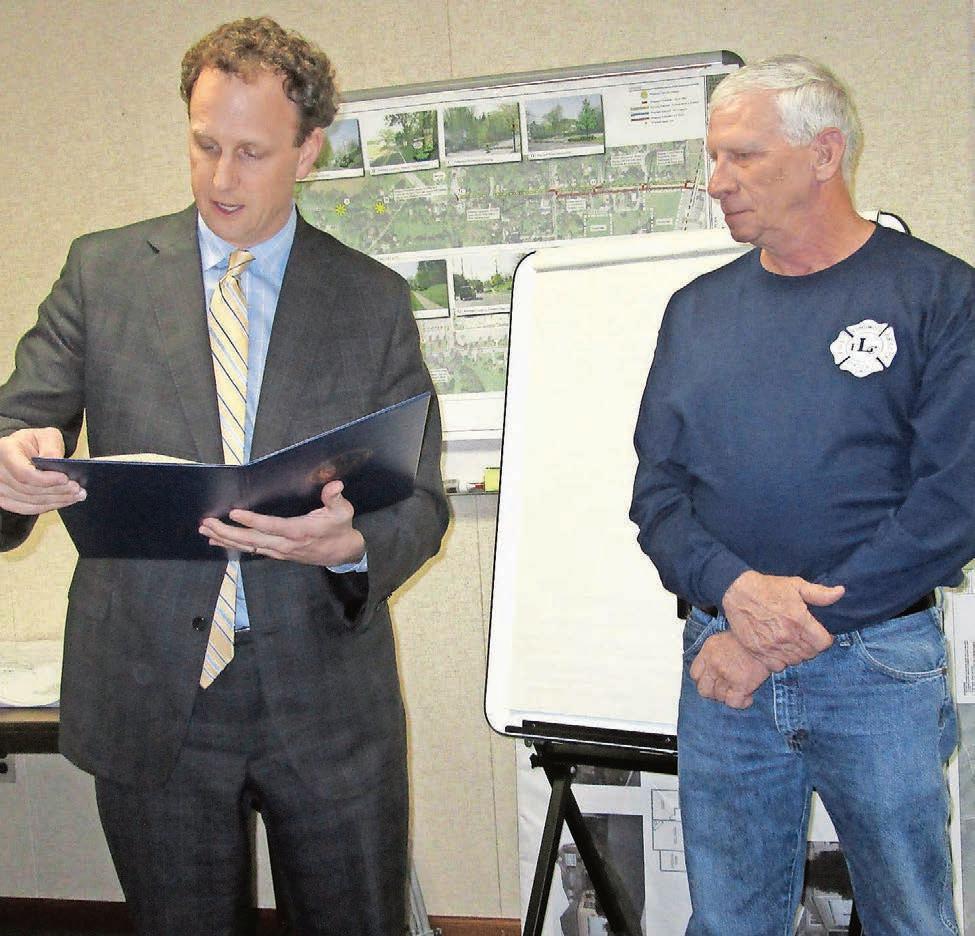
Dennis Mellinger will retire as roadmaster of East Marlborough Township this month. Board of Supervisors chairman Richard Hannum read a proclamation thanking Mellinger for his service.
projected 700 participants running in shifts during the night. About 8,500 participants are expected on Saturday, and about 2,000 on Sunday. Traffic monitoring and security have been established, and the organizers said the timing of their event will not conflict with the After Prom at Unionville High School, which is scheduled the same night. The board approved the road closures. A discussion of tree removal at a home construction site stretched over an hour. The property, at 416 Locust Lane, is fully wooded. Rodderick Harrison presented his plan, which involves removing a stand of about 45 trees to fit in the house and driveway,
including the removal of two specimen trees, which are larger than 36 inches in diameter. The two trees are in failing condition, but the board ended up requesting an outside arborist give a professional opinion on them. If the trees are deemed a hazard, the builder will not be required to replace them with 12 new trees planted either at the site or elsewhere in the township. Hannum said the board will move quickly to get the appraisal and let Harrison know, so that he can start tree removal and construction at the site.
In other business, the board quickly granted permission for a company to sell fireworks in a tent on the Walmart parking lot on Route 1 for 10

There was a big send-off for two champion student groups at Unionville High School on April 3, as the Indoor Color Guard and Indoor Percussion groups got ready to leave for the Winter Guard International World Championships in Dayton, Ohio.
Both groups are currently ranked in first place in their regional Scholastic A Division. The students from both groups practice three times a week for three hours per night, and compete every weekend of the season. They also practice on their own each week. On a competition day, they will practice for another three or more hours before riding the bus to the



By Richard L. Gaw Staff Writer
A total of 650 high school seniors, transfer students and over 400 family members and friends converged on the campus of Lincoln University last Friday to attend the “Feel the Roar” Spring Commitment Day open house festivities.
The four-hour event gave students who have been accepted to the university for the start of the 2017-18 academic year an extensive opportunity to tour several academic facilities, and speak to current students, faculty and administration.
After checking at the university’s International Cultural Center (ICC), guests were welcomed by Interim President Dr. Richard Greene, Provost Dr. Patricia Ramsey, Associate Vice President for Enrollment Management Kimberly Taylor Benns and Associate Director of Admissions Nikoia Fredericksen, in the ICC Auditorium.
Despite a persistent rain throughout the day, several current students gave campus tours that included a visit to the Student Union Building, and lunch at the Wellness Center.
The event concluded with a pep rally in the auditorium.
Over the course of its 161-year history, Lincoln has earned a worldwide reputation for combining a liberal arts and sciencesbased undergraduate
curriculum with with select graduate programs that prepare students for a highly technological and global society.
The university has graduated an impressive list of educators, businesspersons, theologians and lawmakers, including former U.S. Supreme Court Justice Thurgood Marshall; Lillian Fishburne, the first African American woman promoted to Rear Admiral in the U.S. Navy; poet Langston Hughes; Kwame Nnkrumah, the first president of Ghana; and Nnamdi Azikiwe, the
first president of Nigeria.
“We want prospective students to know that Lincoln University is an excellent university, and one where faculty and staff are intentional about helping them reach their goal of graduation,” Dr. Ramsey said. “We prepare these students for life and success in the global marketplace.
“Here at Lincoln, we know our students not only by their names, but also by their aspirations.”
To contact Staff Writer Richard L. Gaw, e-mail rgaw@chestercounty.com.



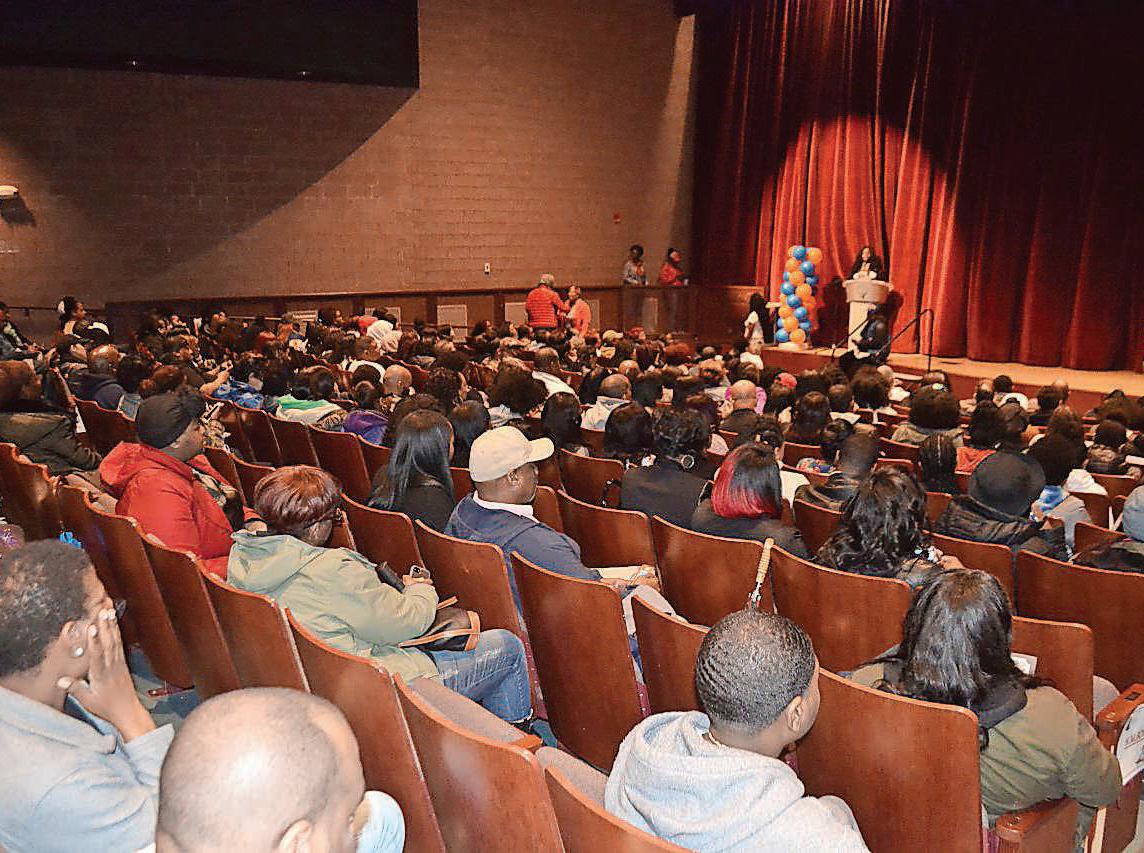





Directly outside the International Cultural Center at Lincoln University’s “Feel the Roar” event for prospective and committed new students on March 31, an early spring rain attempted to wash out the great expectations that the welcome address had built up inside the large auditorium moments before. It didn’t work.
The Chester County Press reporter sat in the rear of the crowded auditorium and listened to the words of Interim President Dr. Richard Green, Provost Dr. Patricia Ramsey and Associate Director of Admissions Nikoia Fredericksen. Their words were inspiring. Their words planted the first bricks in hundreds of individual journeys that will begin on this campus in the fall.
As students and parents began to file out of the auditorium to a series of breakout sessions, tours and a pep rally, the reporter juxtaposed the positivity he was seeing against the backdrop of our nation’s current climate, the news of which has minimized Optimism to a precious drop of water in a sweeping drought of Fear that attempts to dismantle the best of who we are, both here in Chester County and all across the nation.
The reporter reads that in order to put a down payment on confronting that Fear, the new administration’s budget includes a $54 billion increase in military spending, and beefed-up funding to help deport more illegal immigrants and build a wall on the border with Mexico. He reads that the budget includes massive cuts in spending for the Environmental Protection Agency, the State Department and the Agriculture Department, as well as 19 other federal agencies, including the Education Department, the Labor Department and the Department of Health and Human Services.
While it is our government’s responsibility to protect its borders and its citizens, these responsibilities should not come at the expense of neglecting them. Consider, for a moment, what severe cuts to agriculture, education, the environment and healthcare would have on Chester County alone. Grants that pay for teacher training, after-school programs, and aid to low-income and minority college students would be downsized. Job training programs that benefit seniors and disadvantaged youth would be reduced. Funding for the insurance provided by Medicare and Medicaid, two vast entitlement programs for older and lower-income Americans, would be wiped away. Indeed, much of the fabric that connects us as a community -- business, education and agriculture -- would be severely threatened.
Seated in this auditorium, the reporter thought, is the future of what our nation will become. For those students in that audience who choose to attend Lincoln University, they will soon become the beneficiaries of a world-class education that sees learning as part of a global classroom, not one marked by boundaries.
Somewhere in this auditorium, he thought, are the future iconoclasts, artists, engineers and the peacemakers of our nation, who will leave Lincoln in four years and launch their knowledge into the world, fearless of Fear, and committed to the idea that leadership is about inclusion, not separation.
Chief Justice Thurgood Marshall, a graduate of Lincoln University, said that “In recognizing the humanity of our fellow beings, we pay ourselves the highest tribute.”
The rain did not let up. The reporter walked to his car, drenched by the weather, and enlightened by Hope.
Letter to the Editor:
There is a group in this community that does nothing but perpetuate negativity among citizens. They appear whenever there is school board activity going on, especially for larger decisions like fullday kindergarten. They offer no solutions, other than to be against the Avon Grove School District’s school board. They will try to convince you that we are victims of bad decisions. Rather than try to unite the community, all they offer is divisiveness. Watch them at school board meetings—their behavior
is juvenile, obstinate and embarrassing.
Our community is a great one. Sure, there is always room for improvement, such as offering full-day kindergarten. Why would you be against that? Why would assume that offering an opportunity for children is a hostile act against you? But that’s what they do. They interpret every act that the Avon Grove School Board does as a personal, reckless attack against them.
A look at their website tells me that they offer no solutions other than to be against the current school board.
They seem to ignore the fact that our community has both a public district and a charter school living in harmony. Many families have kids in both. Why would you want to try to pit one against the other? But that is their message. If there is a rift between the two, they have no desire or plans to fix it, only to widen it. Any negativity they talk about is self-imposed. The Avon Grove School District community has done nothing but accept and promote all kinds of learning. We need school board members who are going to
promote a positive learning environment that is always striving to be better—in both the public schools and the public charter school. We do not need another leader of any kind claiming that we’re going to be “great,” but not offering any concrete solutions or cohesiveness to make it happen. I do pay taxes in Avon Grove School District, but this group doesn’t speak for me. Make sure you learn if they really speak for you before you vote on May 16.
Lisa Lightner
By Gene Pisasale
The 19th century was a period of dramatic developments in science, technology and ways of thinking. It was also a changeover from the era of the Enlightenment to one more focused on expression in the age of Romanticism. Romantics highlighted the powers of the individual through creativity, finding new, even mystical meanings in nature. Bayard Taylor’s books exhibit this style, his poetical connections with each landscape he traversed around the world.
After nearly fifteen years of traveling, Taylor was ready to settle down. He broke ground for what became Cedarcroft, a sturdy brick mansion outside of Kennett Square. The name derived from the English word “croft” (meaning field), surrounded by cedar trees. The cornerstone was laid on June 5, 1859. Under it is a box containing a copy of Views A-foot (Taylor’s first travel book), a poem written by him, some coins, a manuscript by friend R.H. Stoddard and personal items. Guests at the housewarming included Ralph Waldo Emerson, John Greenleaf Whittier, James Russell Lowell and Horace Greeley. The years leading up to 1860 were ones of turmoil in America. Tensions regarding slavery had erupted into numerous bloody uprisings around the country. Bayard Taylor opposed slavery and openly supported a country lawyer from Illinois for President. Taylor gave at least two public speeches backing Abraham Lincoln, one in Kennett Square, the other in Chadds Ford to a crowd estimated at over 15,000 persons.
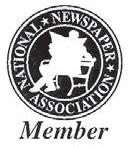
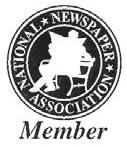
His endorsement of Lincoln paid off. In 1862, he accepted a position as secretary to Simon Cameron with his entourage in St. Petersburg, Russia. Taylor later became charge d’affaires. While he never fought in the Civil War, Taylor had a close connection to the conflict. His brother Charles became the youngest Colonel in the Army of the Potomac. He led the “Bucktails,” a group of volunteers from Chester and surrounding counties who fought throughout the war. Charles was killed defending Little Round Top on day two of the Battle of Gettysburg. Monuments to him and the Bucktails stand proudly on the nearby hillside. Bayard gifted a cannon—nicknamed Old Ben Butler—to the town
of Kennett Square. It was fired in celebration of every Union victory during the war. The cannon now stands at Kennett Borough Hall. Taylor’s experiences in Russia inspired him to start a new series of lectures. In 1863, he presented his ideas in Washington, D.C. President Lincoln was in attendance and was impressed, later writing Taylor a letter. “My dear Sir: I think a good lecture or two on ‘Serfs, Serfdom, and Emancipation in Russia’ would be both interesting and valuable. Could not you get up such a thing? Yours truly. A Lincoln.” Having dominated the lecture circuit and the travel genre, Taylor was ready for something different. His novel, “The Story of Kennett” (1866) returned the author to his roots. In the Prologue, he writes: “To my friends and neighbors in Kennett: I… dedicate this story to you…” The book chronicles life in Chester County following the American Revolution; the interactions of local families form its framework. Chadds Ford village historian Chris Sanderson made notes within his copy of the book identifying the actual persons depicted in the novel. The Fairthorns supposedly represent Taylor’s own family; Sandy Flash a real life outlaw of the time. While not a world-class novel, the book does capture the sensibilities of people in rural America during this period. Taylor later ventured again out West, this time around Colorado on horseback with a group that included William Byers, editor of The Rocky Mountain News. The trek resulted in “Colorado: A Summer Trip” (1867). The introduction to a later edition states: “Taylor’s account stands as a world-class observer’s first-class treatment of territory that few were competing to present to a literate and sophisticated constituency.” The work remains a classic of western travel literature. Taylor’s wanderings may have inspired another gentleman to write. Samuel Langhorne Clemens, known today as Mark Twain, portrayed his experiences through Europe and the Holy Land in “The Innocents Abroad” and western mining camps in “Roughing It.” It was terrain Taylor knew quite well. From 1870 to 1871, Taylor combined his knowledge of German with his love of poetry in his two-volume translation of Goethe’s Faust. Taylor’s book was
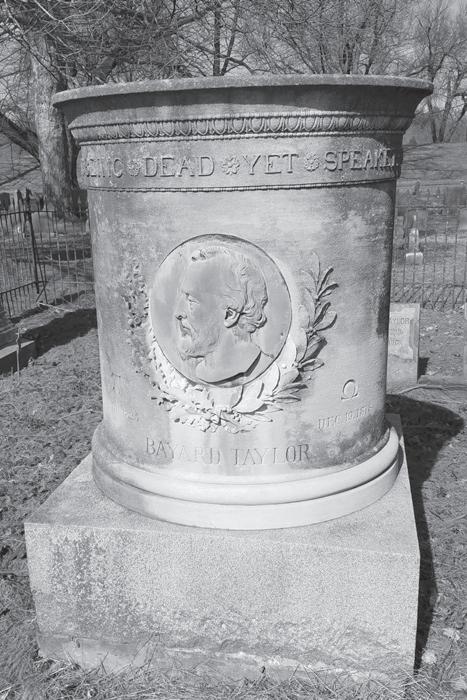
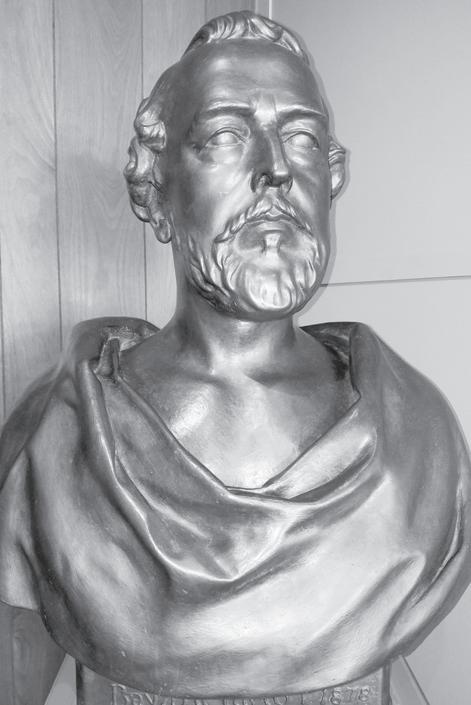
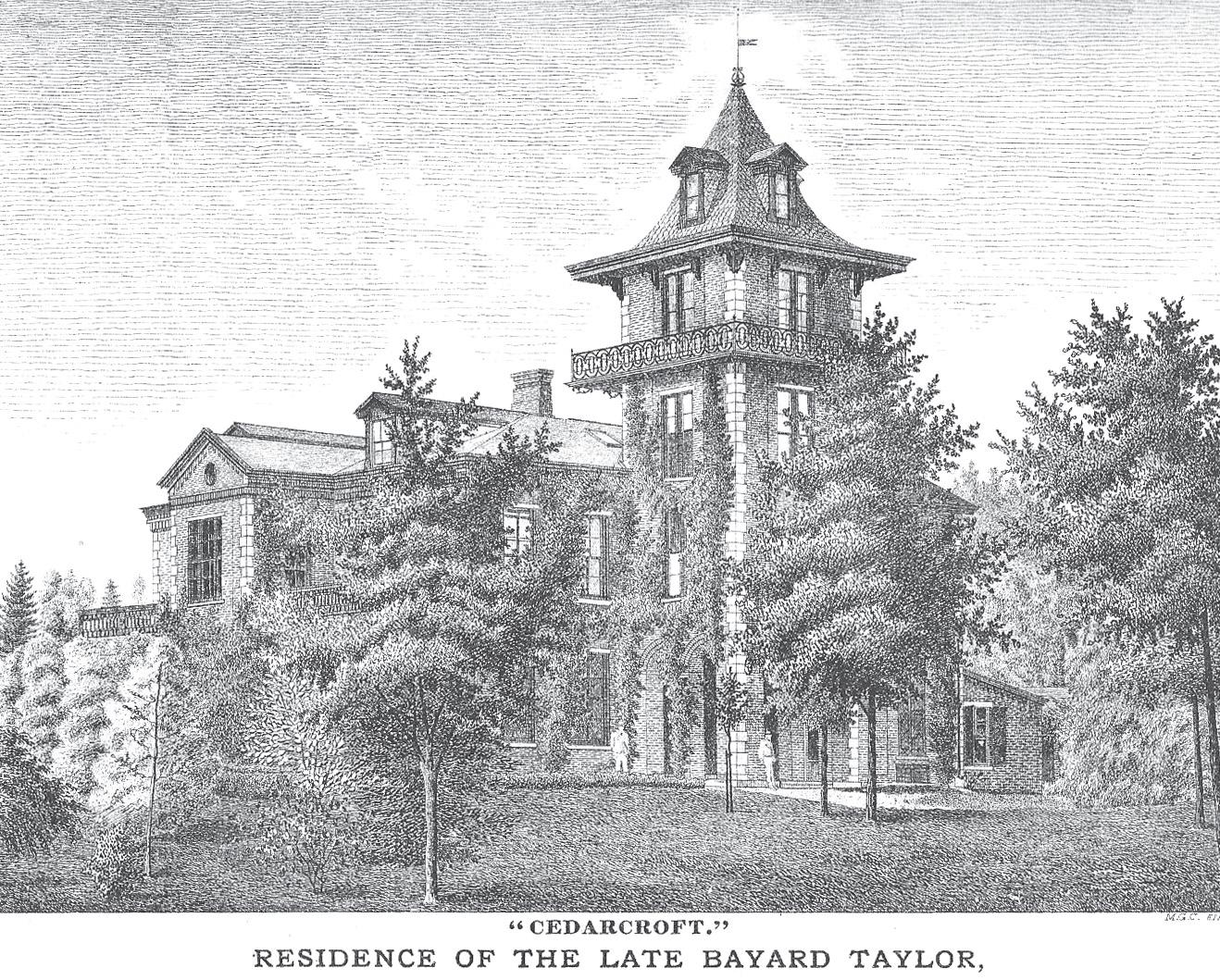
well received and remains one of the most acclaimed interpretations of this classic. Because of his experience, he was appointed Minister to Berlin in 1878. On the ship going over to the continent he chatted with Twain, who admired his work.
Unfortunately, Taylor’s European stay would be short. He died a few months later on Dec. 19, 1878. The next day, the Wilmington News Journal printed the announcement. “The Poet, Novelist, Traveler and Diplomatist Dies Quietly at his Post of Duty… It is as an author and a poet that he will be remembered with ever increasing admiration and respect…” Newspapers across America mourned his passing. The New York Times posted his obituary on the front page, noting him as “a great traveler, both on land and paper.” His body was returned to the U.S., the casket displayed in New York’s City Hall.
On March 15, 1879, Taylor was honored lying in state at Cedarcroft before he was laid to rest at Longwood Cemetery. Above his grave is a cylinder of Indiana limestone, on its side a bronze bas-relief of the poet. His brother Charles, hero at Gettysburg, lies next to him.
In his 53 years, Bayard Taylor experienced more than most people could see in five lifetimes. Yet his poetry is simple and ele-
gant, yearnings of a soul constantly seeking new insights. Taylor’s “The Ghosts of Night” hints at his ambition and realization that his time on Earth was limited. “My deeds are dust in air… My words are ghosts of thought… I ride through the night alone, detached from the life that seemed… And the best I have felt or known… Is less than the least I dreamed.” These dreams come alive in his books, showcased at Macaluso’s Rare Books in Kennett Square. A beautiful bust of Bayard Taylor is prominently displayed nearby in the Kennett Library next to a plaque honoring his many achievements. Gene Pisasale is a historian and author based in Kennett Square. His nine books and lecture series focus on the history of the Chester County and MidAtlantic region. His radio show, “Living History,” is on WCHE AM 1520 every Wednesday from 1 to 1:30 p.m. His new book, “Alexander Hamilton: Architect of the American Financial System,” is available on Amazon.com. He can be reached at Gene@ GenePisasle.com. For more information, visit his website at www.GenePisasale.com.
(Editor’s note: This concludes a three-part series about the life of Bayard Taylor.)
By Steven Hoffman Staff Writer
The calendar may have still said March, but Unionville was in mid-season form as they defeated West Chester Rustin, 10-1, on March 30.
All the classic elements of “Unionville baseball” were on full display— aggressive baserunning, solid defense, and clutch hitting. A four-run third inning propelled the Indians to the win.
The Indians claimed an early lead in the bottom of the first when Spencer Pellegrino led off with a walk. He stole second base and scored on a sharp single to right-center by Theron Schilling—one of three hits that Schilling would have on the afternoon.
Pellegrino started the bottom of the third with a
single, advanced to second on a steal, and scored on a hit by Schilling. Joe Love plated two runs when he singled and there was an error on the play. Jason Moore then made it 5-1 with a single.
Meanwhile, Unionville starting pitcher Nick Samulewicz was doing a good job keeping the West Chester Rustin hitters at bay. Samulewicz scattered four hits and allowed just one run in a complete game effort.
The victory improved Unionville’s record to 2-0 early in the 2017 season. Next, the Indians are scheduled to host Octorara on April 7 and will travel to Great Valley on April 12.
To contact Staff Writer Steven Hoffman, email editor@chestercounty. com.

Unionville pitcher Nick Samulewicz scattered four hits and allowed just one run.





saw borough officials consider more than 50 applications for the position.
“At the end of the day, he was the best candidate for the job,” said Kennett Square Borough Mayor Matthew Fetick. “He was the best-qualified candidate, and the one who brought what we are looking for. He has the experience that we want with communityoriented policing.”
Holdsworth was sworn in as the new police chief at the council meeting on Monday night, shortly after council unanimously approved his new contract. The entire Kennett Square Police Department lined up to watch Holdsworth be sworn in. Former Kennett Square Borough police chiefs Edward Zunino and Albert McCarthy were on hand as well, as were law enforcement officials from
Continued from Page 1A
throughout the county.
Council member Wayne Braffman said that at the beginning of the search for a new police chief, he thought that the decision would be the biggest one that the borough council would make.
“We got the decision right, and I’m delighted to be able to support this tonight,” Braffman said.
Fetick said that the applications came from candidates from across the country. The search committee conducted interviews with about 15 candidates, and Holdsworth stood out at the end of each round of interviews. The search committee was unanimous in its support for Holdsworth, Fetick said.
Kennett Square Borough officials certainly know Holdsworth’s credentials and work ethic well. He was first hired as a parttime police officer with the borough in June of 1997.
of years. Uncle Irvin met him when he wrote a column for the Philadelphia Inquirer about journalism at small town weekly newspapers, and specifically a battle of words with a former Oxford school board president, Chauncey Boyd.
He briefly left the department in 1998 when he was hired as a full-time officer with the Phoenixville Police Department, but returned as a full-time police officer with the Kennett Square Police Department in September of 1998. He has been moving up the ranks since then. In May of 2001, he was promoted to the corporal position, and was assigned as the patrol supervisor for the department. He was promoted to the position of lieutenant in 2016, and was then designated as the Officer In Charge when longtime police chief Edward Zunino announced that he was retiring after a distinguished 40-year career with the police department.
Holdsworth said that he wanted the opportunity to serve as police chief for Kennett Square because he knows the town and the operations of the police department so well. He has lived in southern Chester
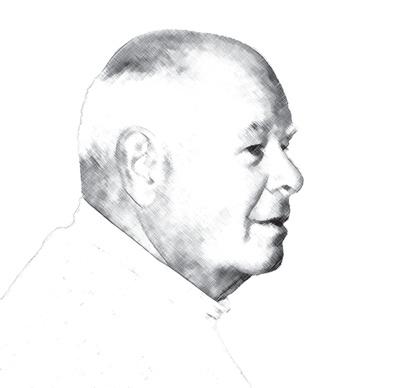
I bring this up because nationally renowned talents like Bowden, who was not born in the area, do not usually seek school board or municipality positions. In fact, I can’t remember such a famous candidate in the last 40 years.
Bowden is obviously an exceptionally skilled writer, and that should be good for the school district. Uncle Irvin, however, cannot predict Bowden’s influence because a great writer does not translate into a great school board member. Hopefully, Bowden will be a good addition to the Kennett School Board, and so we wish him well.
(Uncle Irvin’s column is his opinion only, and is not a news story.)
County for more than 40 years. He is a 1990 graduate of Unionville High School. He owned and operated a landscaping company from 1992 to 2001. He graduated from the Municipal Police Academy in 1995, and then embarked on his career in law enforcement.
Holdsworth and his wife, Debbie, have four children.
“I love the community and this police department,” Holdworth said.
Fetick said that as word spread that Holdsworth would be promoted to the police chief position, he heard nothing but positive comments from people in the community who know Holdsworth’s work.
Fetick added that Holdsworth shared a good
vision and goals for the police department with the search committee members during the interview process. The mayor also said that it helped to reach the conclusion that Holdsworth is the best fit for the job because he has already worked closely with him.
“He has done everything that I’ve ever asked him to do, and he has done it with integrity and with a dedication to the Kennett Square community,” Fetick said.
As Holdsworth formally starts the new position, there will be some other changes taking place in the police department. Three new fulltime officers—Johnathan Ortiz, Evan Jackson, and Alex Schwab—were sworn in on the same evening as
Holdsworth. Fetick noted that the borough lost several experienced police officers within the last year, as one left to accept a higher position with another department and a few others retired. He expressed his confidence that the new police chief is prepared to handle the challenges of hiring and training younger officers to continue to deliver the kind of policing services that Kennett Square residents and business owners have grown accustomed to. “Bill is ready and capable of growing the department,” Fetick said.
To contact Staff Writer Steven Hoffman, email editor@chestercounty.com.












After two years of renovations, the Main Fountain Garden makes its debut in May
By John Chambless Staff Writer
The greatest compliment that could be given to the renovation of the Longwood Gardens Main Fountain Garden is this: Founder Pierre S. du Pont would have approved.
After a two-year project that cost $90 million, the Fountain Garden opens its season on May 27 with broad walkways, a fully operational and restored South Wall of fountains, more spectacular water jets and LED lighting that will dazzle visitors in brand new ways.
During a media preview at Longwood on March 29, Longwood president and CEO Paul Redman paid tribute to the artistic vision and engineering skills of du Pont. “The Fountain Garden is an iconic piece, the last piece he designed for Longwood, and it had worked with original equipment from the day he started in 1931 up until 2014, so he really did it right,” Redman said.
But time had caught up with the fountain system before it was partially closed in October 2014. The South Wall of fountains “hadn’t worked for 25 years, so there is an entire generation who has never seen it in operation,” Redman said.
“We bought it to life again.”
Before the 2014 work, crews had to dig up one problem area and re-close it
so often that it was dubed “the zipper,” Redman said. “We wanted to use new technology and make it easier to perform upkeep, so we preserved the old and added new features,” he said.
“So it looks the same – but better.”
Redman said some 3,000 people have been involved in the renovations, including companies from the region and around the world that signed on to contribute expertise, workers and designs.
Visitors will first notice that the garden looks much larger. Broad avenues with new trees and benches have been added along both sides of the garden, creating “allees,” or avenues, in the European tradition. While the whole garden was theoretically open to anyone during fountain shows, people often didn’t walk onto the grass because the area didn’t look inviting. That has been solved with a new design that incorporates seating-level walls, new lighting, 5,700 feet of new walkways, and a broad avenue along the South Wall that invites strolling and lingering.
During a walk-through of the gardens, while workers were still busily putting finishing touches here and there, Redman pointed out that “about 2 million decisions” had been made about every aspect of the renovations – new railings,
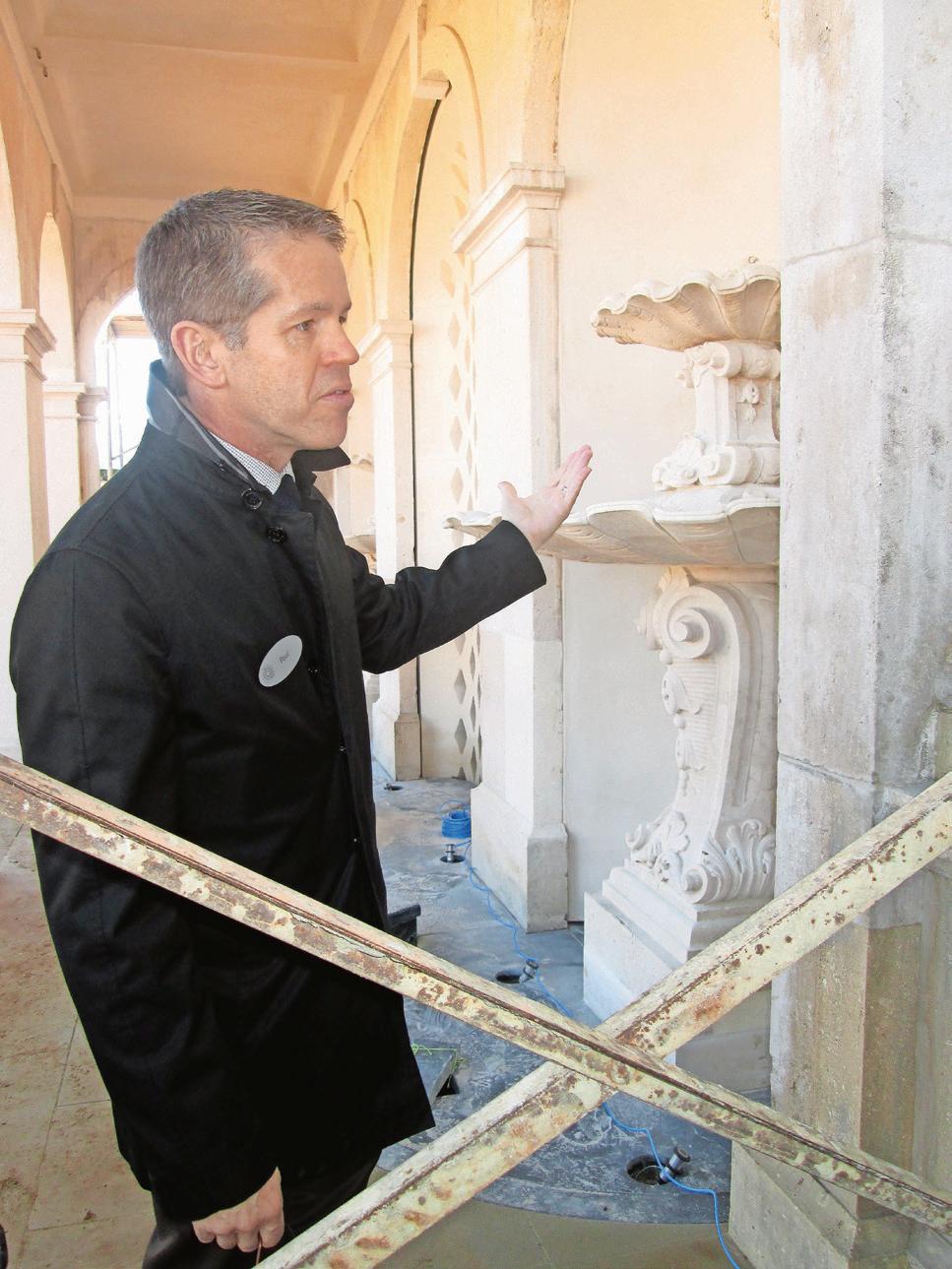

new boxwood plantings, a stairway and elevator that lets visitors see the spectacle from above, and a spot on the upper level walkway that’s about 10 feet away from the huge jets that will shoot water up to 175 feet in the air during the daily fountain shows. It’s going to be a must-visit spot to feel immersed in the shows.
The South Wall has more than 4,000 pieces of original limestone sculptures and fountains that were shipped out, piece by piece, to a Conshohocken company for cleaning and restoration. More than 800 pieces were created to replace parts that were beyond repair.
Not that visitors will be counting, but there are 379 original water jets in the Main Fountain Garden, plus 1,340 new jets that will make water move in previously unseen ways – such as a basketweave pattern, swaying curtains of water, and combinations of patterns that create an endless array, all lit by LED lights at night. And there’s a nozzle that will shoot a foot-high flame atop a 10-foot-tall water jet. That effect is seen nowhere else in the world, Redman said.
There’s a Pumphouse Plaza cafe at the western end of the South Wall where visitors can enjoy snacks and drinks outdoors. The cafe has one of du Pont’s original lead fountains that he created to use as a test model. The new Pump Room exhibit nearby will show off the original, huge pumps that once made the fountains work.
But perhaps the quiet showpiece of the new Fountain Garden is The Grotto, a stone-lined room in the middle of the South Wall. Visitors enter down a gently sloped tunnel to a room where water trickles into a pool on one side, while a circular fountain

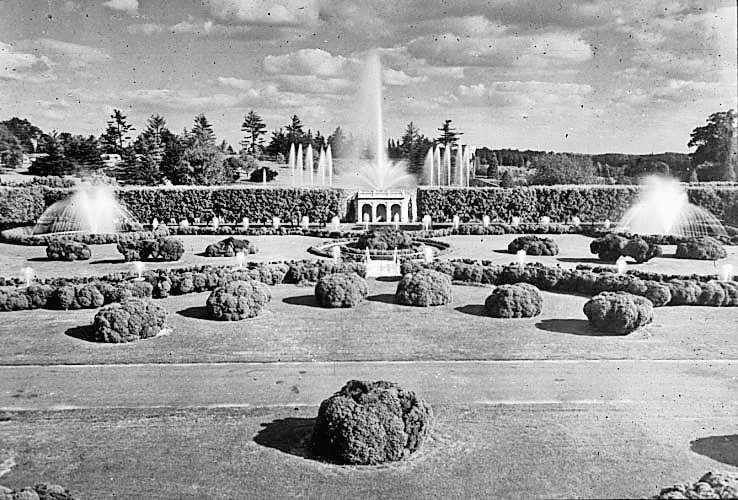
runs from floor to ceiling in the middle of the
The cool, subdued room is intended to be “a place of spiritual beauty,” Redman said, giving visitors a feeling of being at the heart of the water all around them. Redman said that, in addition to the carefully designed spectacle above ground, “90 percent of our visitors will never see the rest of the renovations” accessible to staff and

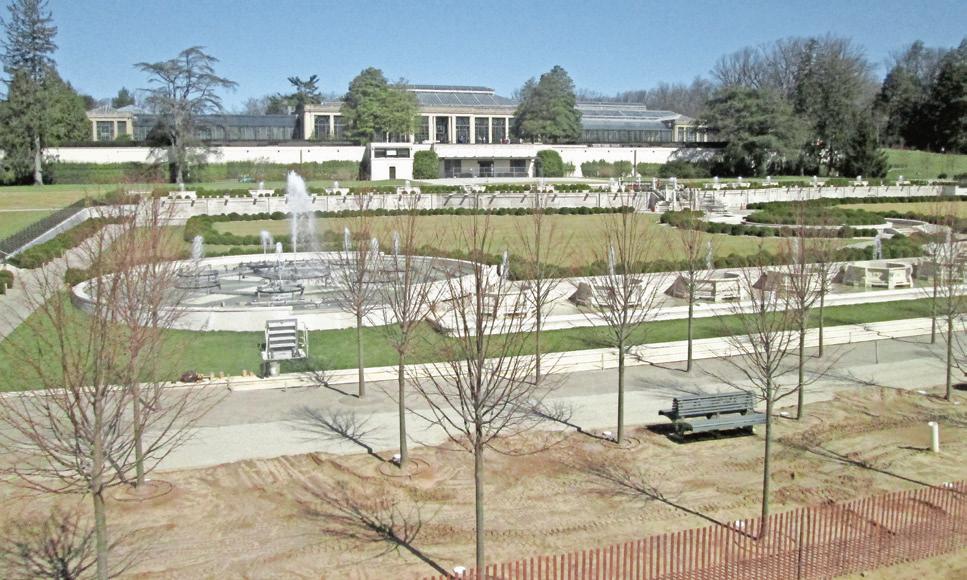

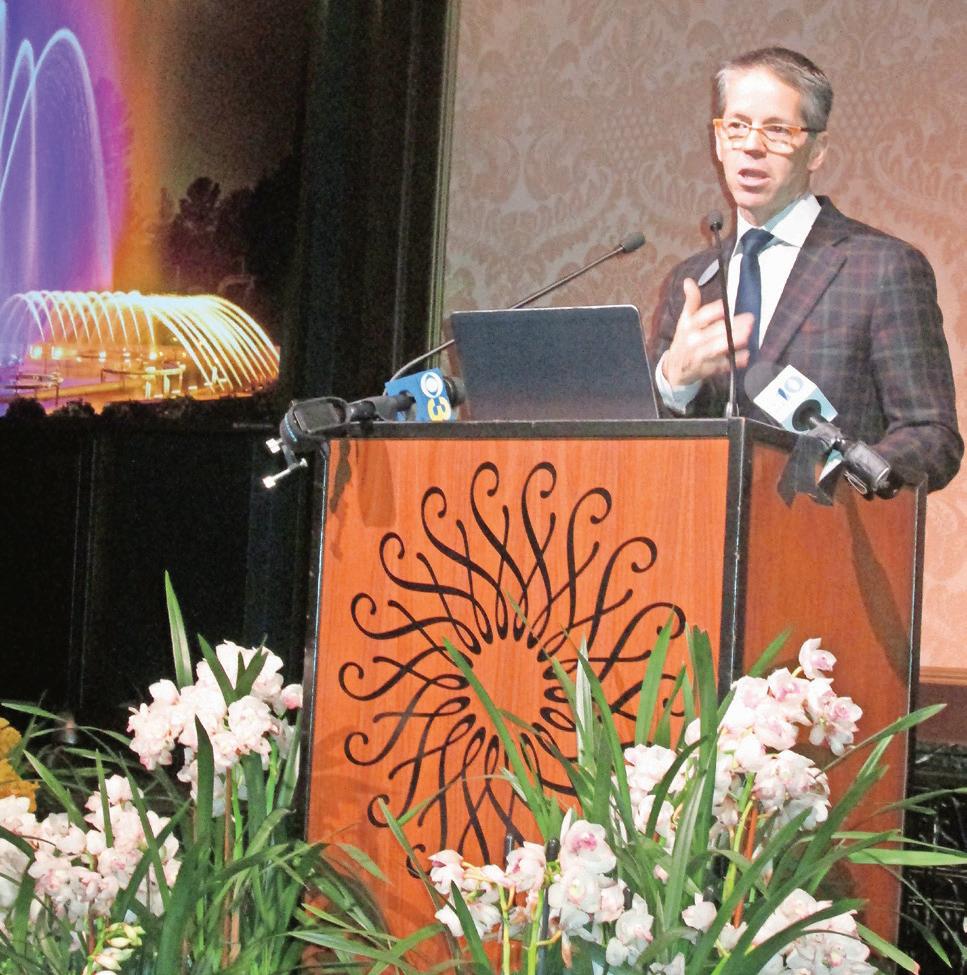
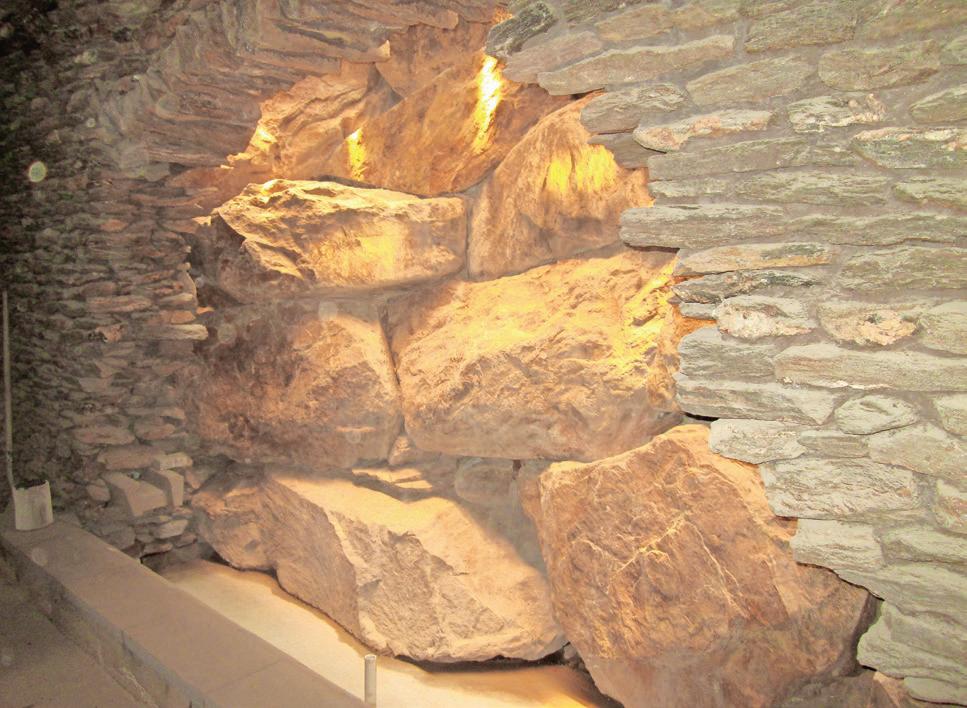

April 7 and 8
‘A Night on Broadway’ Lincoln University’s Performing Arts
Department presents its spring musical, “A Night on Broadway,” on April 7 and 8 in the Ware Center Theater on Lincoln University’s main campus. Evening performances are Friday and Saturday at 7 p.m., with a Saturday matinee at 2 p.m. The 75-minute show is free (donations are welcome). The cast, comprised of community members and Lincoln students, will perform a total of 15 songs from well-known Broadway and off-Broadway musicals. Lincoln University is at 1570 Baltimore Pike, Lincoln University. For more information, call 484-365-7555.
April 8
Chicken barbecue
The Chatham United Methodist Church (3215 Gap Newport Pike, West Grove, in the Village of Chatham) hosts a chicken barbecue on April 8 from 10 a.m. to 3 p.m. Half a chicken is $6.
April 9
Record Collectors show
The Keystone Record Collectors Music Expo will be held at the Continental Inn (2285 Lincoln Highway east, Route 30) on April 9 from 9 a.m. to 3 p.m. Dealers will buy, sell and trade records, CDs and music memorabilia. Admission is free. Call 610-932-7852 or visit www.recordcollectors.org.
April 11
‘Easter Parade’ tea
The Kennett Area Senior Center (427 S. Walnut St.,
Kennett Square) holds its monthly tea party on April 11 from 2 to 3:30 p.m. The theme is “Easter Parade.”
Ladies are encouraged to wear their favorite Easter bonnets. There will be tea sandwiches, desserts and fine teas. The cost is $10 for members and $12 for non-members. For reservations, call 610-444-4819.
April 20 to 28
‘Fiddler on the Roof’ auditions
Avon Grove Community Theater will present the musical “Fiddler on the Roof” in July, and auditions are scheduled on April 20, 21, 22, 27 and 28 at the Kemblesville United Methodist Church (1772 New London Rd., Kemblesville). Those interested in auditioning should visit www. actheater.org and pick a time to audition. The show will be staged July 21, 22, 27 and 29 at 7 p.m., and July 23 and 30 at 2 p.m. No prior experience is required to audition.
April 22
Chicken barbecue Russellville Grange 91, on Route 896, one block north of Route 10, will host a chicken barbecue on April 22 from 3 p.m. until sold out. Patrons may dine in or take out. The meal includes half a chicken, potato salad, pickled cabbage, applesauce, beverage, roll, and dessert. The meal is $10 ($6 for children), and half a chicken only is $6. Call 610-255-5418 for more information.
April 29
Youth Orchestra concert
The Chester County
Youth Orchestra will present its annual spring concert on April 29 at 7:30 p.m. at the Westminster Presbyterian Church (10 W. Pleasant Grove Rd., West Chester). Tickets will be available at the door and will benefit the West Chester Food Cupboard. The program includes “Marche Militaire” by Saint-Saens, “St. Paul’s Suite” for strings by Holst, “Les Preludes” by Liszt and “Pavane” composed by Faure. CCYO is seeking musically talented students from the ages of 11 to 18. Spring audition dates for all instruments will be posted on the orchestra’s website. Auditions for instrumentation still needed will also be held in the fall. Visit www.ccyo. org.
Kennett Flash schedule
The Kennett Flash (102 Sycamore Alley, Kennett Square) hosts regional and national artists. Tickets are available in advance at www.kennettflash.org, or at the door. Snacks and beverages are sold, or guests can BYOB. The schedule includes: Too Pretty For Parties, Recording Club and Ryan Casey (April 7, 8 p.m., $10 and $14); Shytown (April 8, 8 p.m., $15 and $18); Peter Bradley Adams with LullanNAs (April 9, 7 p.m., $15 and $20); Arlen Roth (April 11, 8 p.m., $23 and $26); Better Than Bacon improv comedy troupe (April 13, 8 p.m., $12 and $14); First Impression: Progressive Classic Rock Tribute (April 14, 8 p.m., $20); The Melton Brothers with Dan May (April 15, 8 p.m., $20 and $24); Hot

Bijouxx (April 20, 8 p.m., $20); The Spring Standards (April 21, 8 p.m., $20); Beatlemania Again (April 22, 8 p.m., $30 and $35); Heather Maloney (April 23, 7 p.m., $15); Local H with Boxcar (April 27, 8 p.m., $16 and $19); A Night With the Kid: The Music of Michael Davis (April 28, 8 p.m., $16 and $20); Tret Fure (April 29, 8 p.m., $20); Countdown to Ecstasy (May 5, 8 p.m., $30 and $35); John Cassidy and friends present an evening of George Harrison (May 6, 8 p.m., $23 and $26); Kim Richey (May 7, 7 p.m., $27 and $30); California Guitar Trio (May 12, 8 p.m., $26 and $30); Rust: Neil Young tribute (May 13, 8 p.m., $18 and $21); Angaleena Presley (May 16, 8 p.m., $17 and $20); The Dan Dechellis Trio (May 18, 8 p.m., $20); Mason Porter and friends present Bob

Former humanitarian aid worker Carl Wilkens will be visiting Kennett High School on April 7 to discuss with the student body his experiences in Rwanda during the 1994 genocide.
Wilkens was the only U.S. citizen to stay behind when foreign nationals were evacuated with many of the UN peacekeepers.
Wilkens’s message is one of hope, empathy, and determination to make a difference. The stories he shares highlight building bridges of peace and focus on those who stood up against violent forces to save lives. Part of his presentation includes his
recent trip to Rwanda in 2016 and the recovery he has witnessed over the past decades.
Kennett High School is also honored to invite the entire community to view Wilkens’s documentary, “I’m Not Leaving,” on April 6 from 7:30 to 9 p.m. in the school’s auditorium. The video presentation will be followed by a Q&A session and book signing.
Wilkens’s visit was arranged by social studies teacher and department chairperson Michael Waite. The week will serve as an opportunity to honor school solidarity, as well as strengthen personal connections and collaboration. Extracurricular clubs and classroom teachers will be incorporating a theme each day into activities and instruction to work toward making not only Kennett High School but also the world a better place.
“We want to make this a special week to celebrate our unity as a school, and having Mr. Wilkens present to share his message of tolerance, kindness, and service is the perfect culminating event,” said Dr. Jeremy Hritz, principal. For more information, contact Michael Waite at Kennett High School at 610-444-6620 or mwaite@ kcsd.org.
Somerville Manning Gallery in Greenville, Del., will open “American Masters: Art of the 19th-21st Centuries” on April 11. The exhibition continues through May 27.
For almost 35 years, Somerville Manning Gallery has specialized in paintings by the Wyeth family. The “American Masters” exhibition continues to juxtapose the artworks of N.C., Andrew, and Jamie Wyeth with the artists of their respective eras. The gallery’s exhibition will run concurrent with the Brandywine River Museum of Art’s exhibition,
“From Homer to Hopper: Experiment and Ingenuity in American Art.” Both shows will feature original paintings by a similar list of artists which explores more than 100 years of masters in the American art world.
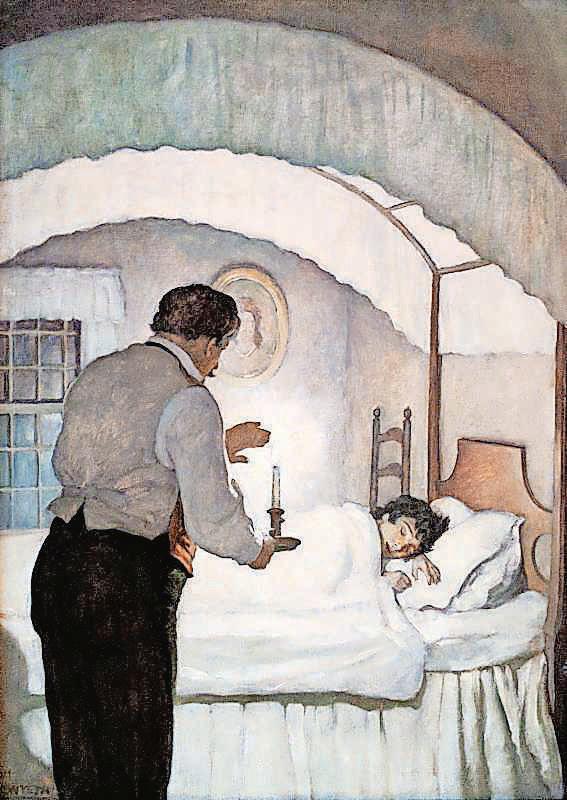
Along with paintings by N.C. Wyeth will be works by American impressionists, Maurice Prendergast, Mary Cassatt, Childe Hassam, John Henry Twachtman and J. Alden Weir. A highlight of the exhibition is a portrait by renowned Philadelphia painter, Thomas Eakins. Works by John Singer Sargent and Winslow Homer will be on view, along with a major work by American modernist Jacob Lawrence.

This N.C. Wyeth illustration for ‘The Little Shepherd of Kingdom Come’ will be part of the upcoming exhibit at the gallery.
Paintings by the father of abstract expressionism, Hans Hofmann, will coincide with the post-war period in which Andrew Wyeth was exploring realism. Contemporary pieces by Jim Dine, Wolf Kahn, and Jamie Wyeth will round out the 21st century. The exhibition includes other works from many important American schools and traditions that run the gamut from realism to abstraction.


During this exhibition, the gallery will be one of the sponsors for events taking place at the Brandywine River Museum of Art to celebrate the 50th anniversary of the Brandywine Conservancy. To explore the work that is done by the Conservancy, the gallery will exhibit paintings in the back gallery that showcase the landscape of the Brandywine Valley. The Somerville Manning Gallery is in Breck’s Mill, 101 Stone Block Row, Greenville, Del. Call 302652-0271 or visit www. somervillemanning.com.
Charles “Chuck” Gawthrop Shoemaker, 93, passed away on Feb. 24 at Kendal at Longwood in Kennett Township. He was born to William MacClean Shoemaker, Jr., and Mary Hickman Gawthrop in 1923 in Kennett Square, the youngest of three children. At the age of 6, he moved with his parents to Wilmington, where he attended Alexis I. duPont School then Wilmington Friends School. In the late 1930s the family purchased a property on Marshall Bridge Road in Kennett Square, where Chuck continued to live until the late 1990s. He graduated from the George School in 1942 and that fall entered Swarthmore College and enrolled in the Naval V-5 program. He received his commission in February 1945, began active service as a flight cadet in the Naval Reserve in June, and was training as a carrier-based night fighter pilot for assignment to the Pacific when the war ended.
In May 1945, he married Joann (Jody) Brosius of Wilmington. In 1946, he matriculated to the Wharton School, University of Pennsylvania, graduating with a BS degree. In 1948, he joined Joseph Brosius, his father-inlaw, in the family lumber business, Brosius & Smedley Company, and in 1966 was instrumental in merging it with the company of his boyhood friend, James T. (Bud) Eliason, of J.T. & L.E. Eliason Inc. to form BrosiusEliason Company of New Castle and Wilmington, Del. At the time of Bud’s death, Chuck became chairman of the company and continued in that role until 2008. As a lifelong resident of Kennett Township, he served 12 years as a Supervisor and, having earned the Boy Scout rank of Eagle while at Wilmington Friends, served as Scoutmaster of Troop 57 and on its board, and the board of Wilmington Friends. A birthright Quaker, Chuck was a member of the Kennett Monthly Meeting of Friends, where he served as Treasurer, Auditor, Clerk of the Trustees, and member of several committees including one that restored and maintained Old Kennett Meeting. He and Jody were members of Kennett Golf and Country Club and a charter member of Greenville Country Club, where he enjoyed tennis. He is survived by two sons, Peter of Townsend, Mass., and Joseph (Jay) of Portland, Ore. He was predeceased by his son Charles in 2007; and wife Jody in 2012. He is also survived by five grandchildren, Andrew, Charles, Anna, Sarah, Alexandretta; and three great-grandchildren. A memorial service will be held at 1:30 p.m. April 29 at Kennett Monthly Meeting (125 West Sickle St.). In lieu of flowers, please send remembrances to Kennett Monthly Meeting, P.0.Box 122, Kennett Square, PA 19348. Online condolences may be made by visiting www.griecocares.com.
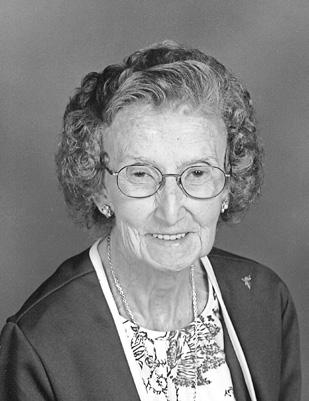
Ethyleen M. McCool, 95, of West Grove, died on March 26 at Twin Pines Health Care Center in West Grove.
She was the wife of the late Frederick Sylvina, who died in 1972. Born in West Grove, she was the daughter of the late Raymond and the late Esther (Weller) McCue. Ethyleen was a store manager for Sheldon’s Department Store in Kennett Square for many years. She enjoyed knitting, and was always helping others. She enjoyed shopping trips to Lancaster on weekends. She was a great mom and a great friend to all who knew and loved her.
Survivors include two sons, Ronald Sylvina and Daniel Sylvina, both of West Grove; and three grandchildren, Anita, Aiden, and C.J. Hersh. She was predeceased by one granddaughter.
A memorial gathering in her memory will be held at 7 p.m. April 21, 2017 at Luther House Apartments (126 Jenners Pond Rd., West Grove) in the parlor of Building number 4. Interment will be held privately. Contributions in her memory may be made to the Foulk & Grieco Funeral Home Inc, 200 Rose Hill Rd., West Grove, PA 19390. To view her online tribute and to share a memory with her family, visit www.griecocares.com.


April 9
‘Eggstravaganza’ West Grove United Methodist Church (300 N. Guernsey Rd., West Grove) will host its annual Easter
‘Eggstravaganza’ on April 9 from 3 to 5 p.m. There will be crafts, games, a giant inflatable, face painting, prizes, a toddler area, refreshments, and an egg hunt with more than 3,000 eggs. All activities are for children ages toddler through grade 4. The hunt occurs all afternoon, so children can hunt at their own pace. The event is held rain or shine. For information, call 610-869-9334 or visit www.westgroveumc.org.
May 6
‘Attic Treasures’
The “Attic Treasurers” sale takes place on May 6 from 9 a.m. to 2 p.m. at Grove United Methodist Church. There will be used books, jewelry, snacks to go, and household items. Light refreshments are available. Call 610-348-0421 or visit www.grovechurch.org.
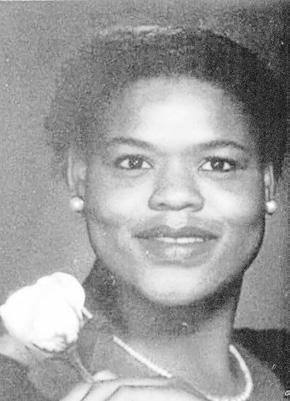
Vivian “Mert” M. Brison, 50, of Coatesville, passed away on March 25 at the Hospital of the University of Pennsylvania. She was the proud mother of Christian Brison, whom she adored. Born in West Chester, she was the daughter of the late Joel M. Brown, Sr., and the late Audrey Brison Fountain. She was a graduate of Avon Grove High School and attended Vocational Tech, where she obtained a cosmetologist degree, and became a licensed cosmetologist. She was employed by the Commonwealth of Pennsylvania and worked in several capacities. She was employed by the West Chester University in housekeeping before she left due to disability. Vivian was a member of the Galilee UAME Church in Avondale, and was a member of Mt. Tabor AME Zion Church, also in Avondale. She loved to cook for family and friends. She also enjoyed traveling, partying, the outdoors and being with her family and friends.
She is survived by her companion, Scott Terry Milbourne; one son, Christian J. Brison of Coatesville; one brother, Joel M. Brown II and his wife Rashida of Lincoln University; three sisters, Elizabeth A. Fountain of Coatesville, Angela Jones White and her husband Darien of Oxford, and Erin N. Fountain of Coatesville; and a host of nieces, nephews, aunts, and uncles, especially aunt Cheryl Brown of West Chester. She was predeceased by one brother, Brian Brison; and her namesake, Vivian G. Brison, her grandmother.
A funeral was held April 1. In lieu of flowers, a contribution may be made to the Avon Grove Church of the Nazarene, 240 East State Road, West Grove, PA 19390. Online condolences may be made by visiting www.griecocares.com.
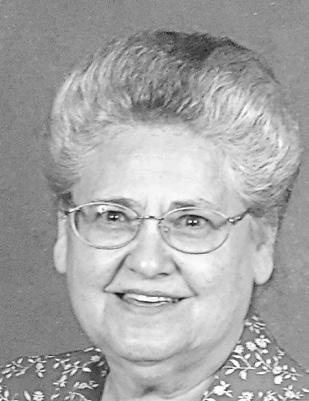
Loretta A. Porter, 81, of Oxford, went home to be with her Lord on March 26 at her home. She was the wife of Rev. Charles I. Porter, with whom she shared 45 years of marriage. Born in Eskdale, W.Va., she was the daughter of the late Ray Carl and Catherine Marie Gayton Allen. Loretta was employed with the DuPont Company in Wilmington until she was married. She was active in the Church of Jesus Christ in Oxford, where her husband pastored since 1972. Loretta was compassionate, always willing to help others. She never wavered in her faith in Jesus dedicating her life the Lord. She is survived by her husband; one son, Paul Joseph Porter and his wife, Lisa M. Porter of Lincoln University; one sister, Louise Burgess of North East, Md.; and two brothers, George R. Allen of Lebanon, Tenn., and Carmen J. Allen of Brenham, Texas.
A funeral was held April 1. Interment was in Oxford Cemetery. Online condolences may be made at www. elcollinsfuneralhome.com.
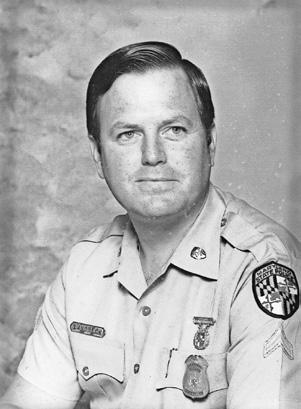
Steven D. Landbeck, 74, died on March 26 after a long battle with Parkinson’s disease at Christiana Care Hospital in Newark, Del.
He is survived by his beloved wife of 38 years, Linda (Anderson) Landbeck; his daughter, Dana Andrews, her husband Michael Andrews and his granddaughter, Chloe Paige Andrews; his mother, Billie D. Landbeck; his brother, John S. Landbeck, Jr. and his wife, Sandra; his brother, Ronald O. Landbeck and his wife, Joyce; and numerous nieces and nephews.
Steven was born in Baltimore, Md. He graduated from Aberdeen High School in 1960 and immediately entered

the Navy. He served on the USS Ranger CVA-61 for four years. He then entered the Maryland State Police in 1964/65 and served with them until an on-duty automobile accident caused him to retire in 1990. He then worked for the Cecil County Sheriff’s Department and various jobs before having to fully retire due to the Parkinson’s. In 2008, he and Linda moved to Richmond Hill, Ga., to be closer to their granddaughter, and most recently moved to Newark, Del. Steven enjoyed his friends, telling jokes, playing pranks, RV camping, working the Cecil County Fair, performing community service and activities, his dogs, his church and family activities.
Funeral services were held March 31. He will be interred with full military honors in a family plot at Little Britain Presbyterian Cemetery, Peach Bottom, Pa. In lieu of flowers, donations in his memory may be made to the MD State Police Memorial, 1300 Reisterstown Rd., Pikesville, MD 21208; or St. Elizabeth Episcopal Church, 16491 Hwy. 144, Richmond Hill, GA 31324. Online condolences may be made at www.elcollinsfuneralhome.com.
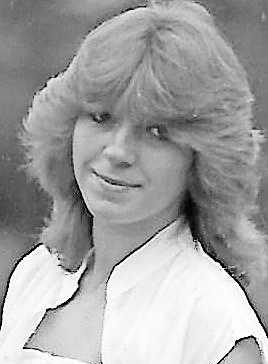
Naoma Jean Sturgill, 52, of Cochranville, passed away on March 27 at Jennersville Regional Hospital. She was the wife of Claude D. Sturgill, with whom she shared 31 years of marriage. Born in Whitney, W.Va., she was the daughter of the late Buddy and Lola McDaniels Coy. Naoma attended New London Baptist Church in Kelton. She enjoyed spending time with her grandchildren, crossword puzzles, cooking and watching the Sci-Fi Channel. She is survived by her husband; one son, C.J. Sturgill of Nottingham; one daughter, Tanya Weber of Oxford; two grandsons; two brothers, David Coy of Cochranville and Gene Coy of Nottingham; four sisters, Nancy Mullins of Cochranville, Nina Miller of Toughkenamon, Linda Coy of Honey Brook and Cheryl Oliver of Oakland, Calif. Funeral services were held April 3. Interment was in Union Hill Cemetery in Kennett Square. In lieu of flowers, donations may be made to the funeral home to offset the cost of the funeral (Edward L. Collins, Jr. Funeral Home, Inc., 86 Pine St., Oxford, PA 19363). Online condolences may be made at www.elcollinsfuneralhome.com.

TheChesterCountyPressfeaturesadedicatedchurch/religious pagethatcanhelpyouadvertiseyourhouseofworshipand/or business.Thepageisupdatedweeklywithnewscripture.Only$10 Weeklyforthisspace. Weareofferingaspecialdiscountof25%offeachandeveryhelp wanted/classifiedadvertisementtoanybusinessthatadvertiseson thePRESSchurchpage. For more information or to place an ad, contact Brenda Butt at 610-869-5553 ext. 10






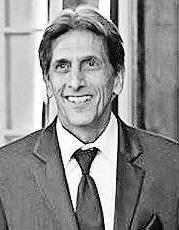
Gregory T. Trunzo, 61, of Lincoln University, passed away on March 28 at his home, after courageously battling cancer for four years.
Born in New Eagle, Pa., he was the son of the late Thomas and Jane Marie Colameco Trunzo. Greg graduated from Monongahela Valley Catholic High School class of 1973. He received his bachelor’s degree in business and economics from Slippery Rock University class of 1976. He was employed as a transportation manager for U.S. Steel, Roadway Express, American Infrastructure and Old Dominion Freight Line. Greg was an active member of Sacred Heart Catholic Church in Oxford. He was an avid Pittsburgh sports fan, especially the Steelers and Penguins. Greg also volunteered for many years as a youth soccer coach, enjoyed golfing, vacationing at the beach, but mostly enjoyed spending time with his family and his many close personal friends.
He is survived by his loving wife, Laurie Huzela Trunzol; three children, Brock Trunzo (Erin) of Williamsport, Jarod Trunzo (Bridgette) of Latrobe, and Lindsey DeGuiseppi (Anthony) of Owings Mills, Md.; eight grandchildren, Nevina, Sidney, Alexander, Dominic, Gabriella, Gianna, Sophia and Avila; one brother, Thomas Trunzo; two sisters, Carol Kacho and Camille Sweger. He was preceded in death by his son, Thomas Emil Trunzo.
A funeral was held April 1. Online condolences may be made at www.elcollinsfuneralhome.com.
Sandra C. Reynolds, 63, of West Grove, passed away peacefully at Neighborhood Hospice in West Chester on March 25.
She was the wife of Stephen C. Reynolds, Sr., with whom she shared 46 years of marriage. Born in Chester, Pa., she was the daughter of the late Alfred and Mary Ward Chew. She was a social worker at Kendal-Crosslands in Kennett Square, and other private and non-profit organizations throughout the years. She also worked as the director of Kennett Area Community Services and United Cerebral Palsy for many years, where she met and worked with many wonderful people. Sandra was a member of Assumption BVM Church in West Grove, and the London Grove Grange. She enjoyed animals, going to the Poconos and Ocean City, Md., bead work, crocheting, needlepoint, and vacations with her grandchildren.
In addition to her husband, she is survived by two sons, Stephen C. Reynolds, Jr., and his wife Colleen of Cranberry Township, Pa., and Christopher Reynolds of West Grove; one daughter, Nicole Reynolds of Elkton, Md.; three brothers, A. Kendall Chew of Claymont, Del., Donald Chew of Pleasantville, N.J., and Edward Chew of Kennett Square;
one sister, Mary Allison Dydo of Middletown Springs, Vt.; five grandchildren, Collin, Alexa, Noah, Claire and Drew; and several nieces and nephews. She was predeceased by one sister, Marilyn Visco.
In lieu of flowers, a contribution may be made to the Leukemia & Lymphoma Society, 100 West 10th Street, Suite 109, Wilmington, DE 19801; or to Assumption BVM Church, 300 State Road, West Grove, PA 19390. Online condolences may be made by visiting www.griecocares.com.
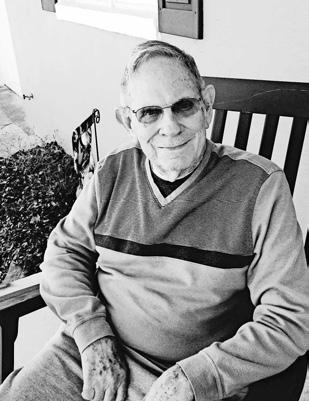
Harry Clayton Witmer, 81, of Oxford, passed away on March 26 at his home. Born in Warwick Township, Chester County, he was the son of the late Harry K. and Martha S. Bedi Witmer. He was the husband of Alice Kimble Witmer, with whom he shared 28 years of marriage. Harry retired from the Kennett Consolidated School District maintenance department. He was formerly employed as a welder and business owner in New Mexico. He was a veteran of the U.S. Army. Harry was a member and past Deacon of Nottingham Presbyterian Church. He enjoyed woodworking, duck carving, dancing, gardening, NASCAR, horses, trail riding, and especially his children, grandchildren and great-grandchildren.
He is survived by his wife, Alice Kimble Witmer; four children, Patti Cushing (Joseph) of Phoenixville, Sean Witmer (Heidi) of Artemas, Lisa Ellis (Craig) of Oxford, and Kim Smith (Scott) of Nottingham; 12 grandchildren, Shanna Rambo, Jon Donaldson, Julia Starkey, Tara McAdams, Christopher Cushing, John Cushing, Chris Petrie, Cheri Petrie, Joseph England, Ross England, Emily Smith and Lola Ellis; nine great-grandchildren; and one brother, Jerry Witmer of Montana. He was preceded in death by his stepmother, Sara Witmer.
A funeral was held March 31. Interment was in the Nottingham Cemetery. Donations in his memory may be made to the Nottingham Presbyterian Church or Brandywine River Valley Hospice, 121 Bell Tower Lane, Oxford, PA 19363. Online condolences may be made at www.elcollinsfuneralhome.com.
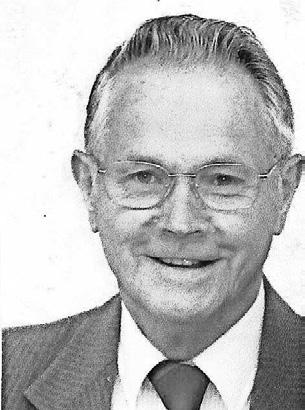
James B. Shepherd, Sr., 81, of Nottingham, passed away on March 26 at Ware Presbyterian Village in Oxford. Born in Fair Hill, Md., he was the son of the late George Bryan and Lena Hackney Shepherd. He was the husband of Marilyn Passerini Shepherd, with whom he shared 23 years of marriage. James was employed with Pinno Pontiac Buick in Oxford as a service manager, and retired after over 50 years of service. He was a member of Gateway Baptist Church in Rising Sun, Md. He was also a member of the NRA and
former member of the Gideons. James enjoyed classic cars and hunting. He hunted 108 deer.
He is survived by his wife; former wife and mother of their children, Anita Allendorfer Bowman of Nottingham; six children, James B. Shepherd, Jr. (Georgeann) of Nottingham, Gary S. Shepherd Sr. (Dawn) of Conestoga, Diane Howard (Donald) of Jacksonville, N.C., Linda Lewis (Charles) of New Providence, Thomas H. Shepherd, Sr. (fiancé Leisa) of Nottingham, Jonathan Shepherd (Victoria) of Greensboro, N.C.; four stepchildren, Rachel Petty of Wilmington, Del., Ben Petty of Elkton, Md., Steven Petty of Tempe, Ariz., and David Petty (Kimberly) of Kernersville, N.C.; 11 grandchildren; 27 great-grandchildren; and six siblings, Gloria Ann Greer of Rising Sun, Md., Georgia Mae Stanley (Herman) of Rising Sun, Md., Shirley Joanne Crouse of Elkton, Md., Anna Lee Ebersole of Kirkwood, Sylvia Louise West (Donald) of Wickenburg, Ariz., and Gale Dean Shepherd (Elsie) of Kirkwood. He was preceded in death by his stepmother, Betty Bare Shepherd; and brother, Kenneth Ralph Shepherd. A funeral was held April 1. Interment was in the Oxford Cemetery. Online condolences may be made at www. elcollinsfuneralhome.com.
Frances S. Ennis, 97, of Oxford, formerly of Glen Mills, passed away peacefully on March 28 at her home.
She was the wife of the late Charles H. Ennis. Born in Media, she was the daughter of the late Samuel and Alice Clayton Smedley. Frances received her nursing degree from the Women’s Hospital in Philadelphia. During World War II, she was the Head Industrial Nurse at the Civic Center Commercial Museum and Convention Hall in Philadelphia. She was a member of St. Christopher’s Episcopal Church in Oxford. Frances was also the chairperson and member of the Elizabeth Price Martin League at Fair Acres Geriatric Center in Lima, and the Women’s League at Jennersville Regional Hospital in West Grove, and volunteered at the Coatesville VA Center. She enjoyed golf, gardening, boating, and hosting at The Farmhouse Restaurant in Avondale.
She is survived by her two sons, Charles L. Ennis (Cindy) of Embreeville, and Jay Ross Ennis of West Grove; one daughter, Gail Tefft of Kennett Square; seven grandchildren, April Pierson, Sunya Jones, Nathan Smedley, Michael Smedley, Megan Tefft, Elizabeth Ward and Charlie Ennis; 11 great-grandchildren; and sister-in-law, Virginia Smedley of Avondale.
A memorial service will be held at 11:30 a.m. April 28 at St. Christopher’s Episcopal Church (116 Lancaster Pike, Oxford). Interment will be private. In lieu of flowers, donations in her memory may be made to St. Christopher’s Church of Oxford; Hospice at VA Medical Center, 1400 Blackhorse Hill Rd, Coatesville, PA 19320; or St. John’s Episcopal Church, 576 Concord Pike, Glen Mills, PA 19342. Online condolences may be made at www.elcollinsfuneralhome.com.

ESTATE NOTICE
ESTATE OF VERNER H. CONDON, JR., DECEASED, Late of the Township of Penn, Chester County, PA, LETTERS
TESTAMENTARY on the above Estate have been granted to the undersigned, who request all persons having claims or demands against the estate of the decedent to make known the same and all persons indebted to the decedent to make payment without delay to ALICE G. CONDON, EXECUTRIX, c/o Joseph E. Lastowka, Jr., Esq., The Madison Bldg., 108 Chesley Dr., Media, PA 19063-1712, Or to her Attorney: JOSEPH E. LASTOWKA, JR., ABBOTT LASTOWKA & OVERHOLT LLP,The Madison Bldg.,108 Chesley Dr.,Media, PA 19063-1712
3p-29-3t
ESTATE NOTICE
Notice is hereby given that Letters Testamentary have been granted to David P. Elvin, Executor for the Estate of Trevor D. Elvin, Jr., whose last address was Oxford, Chester County, Pennsylvania. Any person having a claim to this Estate is asked to make same c/o R. Samuel McMichael, Esquire, PO Box 296, Oxford, PA 19363. 3p-29-3t
ESTATE NOTICE
Notice is hereby given that Letters of Administration have been granted to John P. Watkins for the Estate of Robert Norville Yerkes, Jr., whose last address was Oxford, Chester County, Pennsylvania. Any person having a claim to this Estate is asked to make same c/o R. Samuel McMichael, Esquire, P.O. Box 296, Oxford, PA 19363.
3p-29-3t
ESTATE NOTICE
Estate of Grace M. Crossan, late of Landenberg, Chester County, Pennsylvania, deceased. Letter Testamentary on the above estate having been granted to the undersigned, all persons indebted to said estate are requested to make immediate payment, and those having legal claims to present the same without delay to: Douglas E. Crossan, Jr., C/O Law Office of Proctor Lindsay & Anderson, 1450 E. Boot Road, Building 400, Suite D, West Chester, PA 19380 or Attorney: Justin B. Anderson, Esquire, 1450 E. Boot Road, Building 400, Suite D, West Chester, PA 19380 3p-29-3t
ESTATE NOTICE
Estate of Andrea L. Henneman, late of West Chester , Chester County, Pennsylvania, deceased. Letter Testamentary on the above Estate having been granted to the undersigned, all persons indebted to said estate are requested to make immediate payment, and those having legal claims to present the same without delay to: Pierson W. Backes, Executor, 80 Marshall Corner Woodsville Rd. , Hope Well NJ. 08525 or his Attorney: C/O Law Office of Kevin A. Pollock Esquire, 100 Federal City Rd. Suite C-104, Lawrenceville, NJ 08648 3p-29-3t
PUBLIC NOTICE
The Elk Township Board of Supervisors will hold their Annual Township Clean-up Day on Saturday, April 22, 2017. The Board will meet at 9:00 A.M. At the Township Building located at 952 Chesterville Road, Lewisville, PA 19351. Supplies such as trash bags and gloves will be provided. Elk Township residents that are of the age ten and older are invited to participate. For further information, please call 610-255-0634.
4p-5-2t NOTICE
BID NOTICE Penn Township, Chester County, Pennsylvania is accepting sealed bids for Snow Removal in the Township for the 2017-2018 season. Bid packages are available at the Township Building, 260 Lewis Road, West Grove, PA 19390. BID NOTICE/ BID ADVERTISEMENT Penn Township, Chester County is requesting bids from qualified Contractors for Snow Removal. This includes furnishing all labor, equipment and materials required to satisfactorily, and safely conduct snow removal. The Township reserves the right to accept or reject any or all bids in whole or in part and to waive any informality the Township may determine necessary. In awarding a bid, the Township may consider, but not be limited to, any of the following factors: qualifications, price, experience, solvency, safety record, financial standing with the Township, warranties, references, insurance bonding, compliance record, delivery date, and past and present service of Contractor. Contractors shall be current on all amounts due to the Township prior to the Township entering into any contract agreement. The Township’s Bid Specifications are available at the Township Office or by email directed to office@penntownship. us. Bids will not receive consideration unless submitted in accordance with the following instructions: Proposals must be signed, sealed, and plainly marked: Penn Township Snow Removal Bid 2017-2018. There will not be
recorded as Chester County # 16919
as follows, to wit:
BEGINNING at a point on the westerly side of Las Rosas Drive, a corner of Lot # 18 on said Plan; thence extending along the same, crossing a 20.00 feet wide sanitary sewer easement, south 87 degrees 47 minutes west 113.31 feet to a point on the easterly side of a 20.00 feet wide alley; thence extending along the same, north 02 degrees 13 minutes 00 seconds west 18.00 feet to a point, a corner of Lot 16; thence extending along the same, re-crossing the aforesaid easement, north 87 degrees 47 minutes 00 seconds east 113.30 feet to a point on the westerly side of Las Rosas Drive, aforesaid; thence extending along the same, south 02 degrees 16 minutes 00 seconds east 18.00 feet to a point, a corner of Lot #18 on said Plan, the first mentioned point and place of beginning.
BEING Lot 17 on said Plan.
a mandatory pre-bid meeting; however, written questions should be directed by mail or email to Karen Versuk, 260 Lewis Road, West Grove, PA 19390 or kversuk@penntownship.us. Bids will be accepted until and opened at 10:00 a.m. on Thursday, April 27, 2017. They will be presented for review and qualification to the Board of Supervisors at their Regular Meeting scheduled on Wednesday, May 3, 2017 at 6:00 p.m. The Township reserves the right to reject any and all bids or any part of the bid or to waive any minor discrepancies in the Bid specifications when deemed to be in the interest of the Township. Specifications may be obtained at the Township Office Monday through Thursday between 9:00 a.m. And 4:00 p.m. 4p-5-2t
PUBLIC NOTICE
Report on the Summary Financial Statement
The accompanying summary financial statement, which comprises the summary assets, liabilities, fund equity, revenues, expenditures, and change in fund equity, is derived from the audited annual audit and financial report of London Grove Township, West Grove, Pennsylvania as of and for the year ended December 31, 2016. We expressed an unmodified audit opinion on the annual audit and financial report dated March 28, 2017.
The summary financial statement does not contain all the information required for a complete presentation under the accounting practices prescribed or permitted by the Department of Community and Economic Development of the Common Wealth of Pennsylvania(“DCED”). Reading the summary financial statement, therefore, is not a substitute for reading the audited annual audit and financial report of London Grove Township, West grove, Pennsylvania.
Management's Responsibility for the Summary Financial Statement
Management is responsible for the summary financial statement in conformity with the accounting practices prescribed or permitted by the DCED.
Auditor's Responsibility
Our responsibility is to express an opinion about whether the summary financial Statement is consistent,in all material aspects, with the audited annual audit and financial report based on our procedures, which were conducted in accordance with the auditing standards generally accepted in the United States of America. The procedures consisted principally of comparing the summary financial statement with the related information in the audited annual audit and financial report from which the summary financial statement has been derived , and evaluating whether the summary financial statement is prepared in accordance with the basis described in the second paragraph of this report.
Opinion
In our opinion, the financial statement of London grove Township, West grove, Pennsylvania as of and for the year ended December 31, 2016 referred to above is consistent, in all material respects , with the audited annual audit and financial report from which it was derived, in accordance with the basis described in the second para graph of this report.
Barbacane, Thornton & Company LLP, Certified Public Accountants 4p-5-2t
NOTICE WEST PETS, INC. has been incorporated under the provisions of the Pennsylvania Business Corporation Law of 1988. Fox & Fox One Montgomery Plaza Suite 706 Norristown, PA 19401 4p-5-1t Sheriff Sale of Real Estate
By virtue of the within mentioned writ directed to Carolyn B. Welsh, Sheriff, will be sold at public sale, in the Chester County Justice Center, 201 West Market Street, West Chester, Pennsylvania, announced on Thursday, April 20th, 2017 at 11AM prevailing time, the hereindescribed real estate. Notice is given to all parties in interest and claimants that the Sheriff will file in her office located in the Chester County Justice Center, Office of the Sheriff, 201 West Market Street, Suite 1201, West Chester, Pennsylvania, a Schedule of Distribution on Monday, May 22nd, 2017. Distribution will be made in accordance with the Schedule unless exceptions are filed hereto within ten (10) days thereafter.
SALE NO. 17-4-213 Writ of Execution No. 2014-03108 DEBT $151,710.88
ALL THAT CERTAIN lot or piece of ground, with the buildings and improvements thereon erected, situate in Kennett Square Borough, Chester County, Commonwealth of Pennsylvania, bounded and described according to a Plan of Las Rosas, dated 9/25/02 last revised 3/3/03 and
particularly described as follows
TAX I.D. #: 39-4-0581
PLAINTIFF: Keystone Federal Credit Union VS DEFENDANT: VANESSA BRANTLEY
SALE ADDRESS: 2759 Fynamore Lane, Downingtown, Pennsylvania 19335
PLAINTIFF ATTORNEY: McCABE, WEISBERG & CONWAY, P.C., 215790-1010
N.B. Ten percent (10%) of the purchase money must be paid at the time and place of sale. 10% payment must be paid in cash, certified check or money order made payable to the purchaser or Sheriff of Chester Co. The final payment must be made payable to Sheriff of Chester Co. & is due twenty-one (21) days from the date of sale by 2PM. CAROLYN B. WELSH, SHERIFF 3p-29-3t
Chester, Pennsylvania, a Schedule of Distribution on Monday, May 22nd, 2017. Distribution will be made in accordance with the Schedule unless exceptions are filed hereto within ten (10) days thereafter.
SALE NO. 17-4-251 Writ of Execution No. 2016-05517 DEBT $190,486.03
ALL THAT CERTAIN lot of land situate in Borough of Avondale, Chester County, Pennsylvania TAX Parcel No.: 4-1-156
PLAINTIFF: McCormick 106, LLC VS DEFENDANT: DENNIS E. BLADEN, KNOWN HEIR OF PEARL IL BROWN n/k/a PEARL I. BLADEN, UNKNOWN HEIRS, SUCCESSORS, ASSIGNS AND ALL PERSONS, FIRMS OR ASSOCIATIONS CLAIMING RIGHT, TITLE OR INTEREST FROM OR UNDER PEARL I. BROWN n/k/a PEARL I. BLADEN
TITLE to said premises vested in Gale A. Lewis by Deed from the Alliance for Better Housing dated July 21, 2006 and recorded August 2, 2006 in the Chester County Recorder of Deeds in Book 6913, Page 665.
PLAINTIFF: U.S. Bank National Association, as Trustee for the Holders of Structured Asset Securities Corporation Mortgage Loan Trust 2006-BC3 VS DEFENDANT: GALE A. LEWIS
SALE ADDRESS: 530 Las Rosas Drive, Kennett Square, PA 19348
PLAINTIFF ATTORNEY: ROBERT W. WILLIAMS, ESQ., 856-482-1400
N.B. Ten percent (10%) of the purchase money must be paid at the time and place of sale. 10% payment must be paid in cash, certified check or money order made payable to the purchaser or Sheriff of Chester Co. The final payment must be made payable to Sheriff of Chester Co. & is due twenty-one (21) days from the date of sale by 2PM. CAROLYN B. WELSH, SHERIFF 3p-29-3t Sheriff Sale of Real Estate
By virtue of the within mentioned writ directed to Carolyn B. Welsh, Sheriff, will be sold at public sale, in the Chester County Justice Center, 201 West Market Street, West Chester, Pennsylvania, announced on Thursday, April 20th, 2017 at 11AM prevailing time, the hereindescribed real estate. Notice is given to all parties in interest and claimants that the Sheriff will file in her office located in the Chester County Justice Center, Office of the Sheriff, 201 West Market Street, Suite 1201, West Chester, Pennsylvania, a Schedule of Distribution on Monday, May 22nd, 2017. Distribution will be made in accordance with the Schedule unless exceptions are filed hereto within ten (10) days thereafter.
SALE NO. 17-4-214 Writ of Execution No. 2016-00901 DEBT $233,335.32
PROPERTY situate in the Sadsbury Township, Chester County, Pennsylvania
BLR# 37-4-40.18A
IMPROVEMENTS thereon: residential dwelling
PLAINTIFF: JPMorgan Chase Bank, N.A. VS DEFENDANT: MARK AQUILANTE and MEGAN McGOVERN-AQUILANTE
SALE ADDRESS: 507 Fox Trail, Parkesburg, PA 19365-2166
PLAINTIFF ATTORNEY: PHELAN HALLINAN DIAMOND & JONES, LLP, 215-563-7000
N.B. Ten percent (10%) of the purchase money must be paid at the time and place of sale. 10% payment must be paid in cash, certified check or money order made payable to the purchaser or Sheriff of Chester Co. The final payment must be made payable to Sheriff of Chester Co. & is due twenty-one (21) days from the date of sale by 2PM. CAROLYN B. WELSH, SHERIFF 3p-29-3t
Sheriff Sale of Real Estate
By virtue of the within mentioned writ directed to Carolyn B. Welsh, Sheriff, will be sold at public sale, in the Chester County Justice Center, 201 West Market Street, West Chester, Pennsylvania, announced on Thursday, April 20th, 2017 at 11AM prevailing time, the hereindescribed real estate. Notice is given to all parties in interest and claimants that the Sheriff will file in her office located in the Chester County Justice Center, Office of the Sheriff, 201 West Market Street, Suite 1201, West Chester, Pennsylvania, a Schedule of Distribution on Monday, May 22nd, 2017. Distribution will be made in accordance with the Schedule unless exceptions are filed hereto within ten (10) days thereafter.
SALE NO. 17-4-233 Writ of Execution No. 2016-05258 DEBT $206,673.43
ALL THAT CERTAIN unit 177W situate in the Township of Caln, County of Chester, Commonwealth of Pennsylvania, as shown on Plan “Foundation As-Built, Building 12, Bailey Station”, prepared for Provident Home Corp., dated December 12, 2007, by Howell Kline Surveying, LLC., West Chester, PA, being more
Sheriff Sale of Real Estate
By virtue of the within mentioned writ directed to Carolyn B. Welsh, Sheriff, will be sold at public sale, in the Chester County Justice Center, 201 West Market Street, West Chester, Pennsylvania, announced on Thursday, April 20th, 2017 at 11AM prevailing time, the hereindescribed real estate. Notice is given to all parties in interest and claimants that the Sheriff will file in her office located in the Chester County Justice Center, Office of the Sheriff, 201 West Market Street, Suite 1201, West Chester, Pennsylvania, a Schedule of Distribution on Monday, May 22nd, 2017. Distribution will be made in accordance with the Schedule unless exceptions are filed hereto within ten (10) days thereafter.
SALE NO. 17-4-246 Writ of Execution No. 2016-10053 DEBT $117,209.41
PROPERTY situate in Borough of New Garden Township TAX Parcel #60-01-0062.040
IMPROVEMENTS: a residential dwelling.
PLAINTIFF: M&T Bank VS DEFENDANT: GERALD W. HARRIS, II
SALE ADDRESS: 4 Rosehill Lane, Toughkenamon, PA 19374
PLAINTIFF ATTORNEY: KML LAW GROUP, P.C., 215-627-1322
N.B. Ten percent (10%) of the purchase money must be paid at the time and place of sale. 10% payment must be paid in cash, certified check or money order made payable to the purchaser or Sheriff of Chester Co. The final payment must be made payable to Sheriff of Chester Co. & is due twenty-one (21) days from the date of sale by 2PM. CAROLYN B. WELSH, SHERIFF 3p-29-3t Sheriff Sale of Real Estate
By virtue of the within mentioned writ directed to Carolyn B. Welsh, Sheriff, will be sold at public sale, in the Chester County Justice Center, 201 West Market Street, West Chester, Pennsylvania, announced on Thursday, April 20th, 2017 at 11AM prevailing time, the hereindescribed real estate. Notice is given to all parties in interest and claimants that the Sheriff will file in her office located in the Chester County Justice Center, Office of the Sheriff, 201 West Market Street, Suite 1201, West Chester, Pennsylvania, a Schedule of Distribution on Monday, May 22nd, 2017. Distribution will be made in accordance with the Schedule unless exceptions are filed hereto within ten (10) days thereafter.
SALE NO. 17-4-248
Writ of Execution No. 2016-00776 DEBT $393,109.51
ALL THAT CERTAIN lot of land situate in Township of Londonderry, Chester County, Pennsylvania
TAX Parcel No. 46-2-263
PLAINTIFF: Bank of America, N.A. VS DEFENDANT: AGNES D. BLAIR
SALE ADDRESS: 411 Wrigley Blvd., Cochranville, PA 19330
PLAINTIFF ATTORNEY: UDREN LAW
OFFICES, P.C., 856-669-5400
N.B. Ten percent (10%) of the purchase money must be paid at the time and place of sale. 10% payment must be paid in cash, certified check or money order made payable to the purchaser or Sheriff of Chester Co. The final payment must be made payable to Sheriff of Chester Co. & is due twenty-one (21) days from the date of sale by 2PM. CAROLYN B. WELSH, SHERIFF 3p-29-3t Sheriff Sale of Real Estate By virtue of the within mentioned writ directed to Carolyn B. Welsh, Sheriff, will be sold at public sale, in the Chester County Justice Center, 201 West Market Street, West Chester, Pennsylvania, announced on Thursday, April 20th, 2017 at 11AM prevailing time, the hereindescribed real estate. Notice is given to all parties in interest and claimants that the Sheriff will file in her office located in the Chester County Justice Center, Office of the Sheriff, 201 West Market Street, Suite 1201, West
SALE ADDRESS: 121 Morris Street, Avondale, PA 19311
PLAINTIFF ATTORNEY: UDREN LAW OFFICES, P.C., 856-669-5400
N.B. Ten percent (10%) of the purchase money must be paid at the time and place of sale. 10% payment must be paid in cash, certified check or money order made payable to the purchaser or Sheriff of Chester Co. The final payment must be made payable to Sheriff of Chester Co. & is due twenty-one (21) days from the date of sale by 2PM. CAROLYN B. WELSH, SHERIFF 3p-29-3t Sheriff Sale of Real Estate
By virtue of the within mentioned writ directed to Carolyn B. Welsh, Sheriff, will be sold at public sale, in the Chester County Justice Center, 201 West Market Street, West Chester, Pennsylvania, announced on Thursday, April 20th, 2017 at 11AM prevailing time, the hereindescribed real estate. Notice is given to all parties in interest and claimants that the Sheriff will file in her office located in the Chester County Justice Center, Office of the Sheriff, 201 West Market Street, Suite 1201, West Chester, Pennsylvania, a Schedule of Distribution on Monday, May 22nd, 2017. Distribution will be made in accordance with the Schedule unless exceptions are filed hereto within ten (10) days thereafter.
SALE NO. 17-4-253 Writ of Execution No. 2015-09026 DEBT $227,617.69
ALL THAT CERTAIN lot or piece of ground situate in the Township of Penn, County of Chester, Commonwealth of Pennsylvania, described according to a plan of property of Charles F. Brackin dated May 12, 1967, made by Manley N. White and recorded at West Chester in Plan Book 26, Page 30, as follows, to wit:
TAX map and parcel number: 58-2-1.7
PLAINTIFF: Bayview Loan Servicing, LLC VS
DEFENDANT: SARA REPINSKI
SALE ADDRESS: 473 North Jennersville Road, Cochranville, Pennsylvania 19330
PLAINTIFF ATTORNEY: McCABE, WEISBERG & CONWAY, P.C., 215790-1010
N.B. Ten percent (10%) of the purchase money must be paid at the time and place of sale. 10% payment must be paid in cash, certified check or money order made payable to the purchaser or Sheriff of Chester Co. The final payment must be made payable to Sheriff of Chester Co. & is due twenty-one (21) days from the date of sale by 2PM. CAROLYN B. WELSH, SHERIFF 3p-29-3t Sheriff Sale of Real Estate
By virtue of the within mentioned writ directed to Carolyn B. Welsh, Sheriff, will be sold at public sale, in the Chester County Justice Center, 201 West Market Street, West Chester, Pennsylvania, announced on Thursday, April 20th, 2017 at 11AM prevailing time, the hereindescribed real estate. Notice is given to all parties in interest and claimants that the Sheriff will file in her office located in the Chester County Justice Center, Office of the Sheriff, 201 West Market Street, Suite 1201, West Chester, Pennsylvania, a Schedule of Distribution on Monday, May 22nd, 2017. Distribution will be made in accordance with
PROPERTY
WENDY BLEVINS
SALE ADDRESS: 694 Elk Ridge Road, Oxford, PA 19363
PLAINTIFF ATTORNEY: MARTHA E. VON ROSENSTIEL, ESQ., 610-3282887
N.B. Ten percent (10%) of the purchase money must be paid at the time and place of sale. 10% payment must be paid in cash, certified check or money order made payable to the purchaser or Sheriff of Chester Co. The final payment must be made payable to Sheriff of Chester Co. & is due twenty-one (21) days from the date of sale by 2PM. CAROLYN B. WELSH, SHERIFF 3p-29-3t Sheriff Sale of Real Estate By virtue of the within mentioned writ directed to Carolyn B. Welsh, Sheriff, will be sold at public sale, in the Chester County Justice Center, 201 West Market Street, West Chester, Pennsylvania, announced on Thursday, April 20th, 2017 at 11AM prevailing time, the hereindescribed real estate. Notice is given to all parties in interest and claimants that the Sheriff will file in her office located in the Chester County Justice Center, Office of the Sheriff, 201 West Market Street, Suite 1201, West Chester, Pennsylvania, a Schedule of Distribution on Monday, May 22nd, 2017. Distribution will be made in accordance with the Schedule unless exceptions are filed hereto within ten (10) days thereafter.
SALE NO. 17-4-280 Writ of Execution No. 2014-05475 DEBT $289,982.41
ALL THAT CERTAIN lot or piece of ground situate in New Garden Township, Chester County, Pennsylvania, bounded and described according to a Final Subdivision Plan of Brittany Hills, made by Hillcrest Associates, Inc., dated 9/27/2000, last revised 3/4/2001 and recorded in Chester County as Plan File #9015749 as follows, to wit:
BEGINNING at a point on the southeasterly side of Brittany Drive, a corner of Lot 42, thence extending along the line of same, south 37 degrees 39 minutes 37 seconds east, crossing the bed of a 20 feet wide access easement, 121.38 feet to a point in the line of Lot 17, thence extending along the line of same, and in the bed of a 20 feet wide access easement south 46 degrees 26 minutes 14 seconds west 3.77 feet to a point in the line of Lot 18, thence extending along the line of same, south 52 degrees 18 minutes 28 seconds west 45.25 feet to a point in the line of Lot 40, thence extending along the line of same, north 37 degrees 39 minutes 37 seconds west, leaving the bed of aforementioned 20 feet wide access easement, 119.88 feet to a point on the southeasterly side of Brittany Drive, aforementioned, thence extending along the line of same, north 52 degrees 20 minutes 23 seconds east 21.72 feet to a point of curve, thence extending along the line of same, along the arc of a circle curving to the left with a radius of 175.00 feet, the arc distance of 27.39 feet to the point of beginning.
CONTAINING 5,882 square feet of land, more or less.
BEING Lot No. 41 on said Plan.
BEING UPI# 60-4-337
BLR# 60-4-337
BEING the same premises which Wilkinson Heritage, L.L.C., a Pennsylvania Limited Liability Company, granted and conveyed unto Steven J. Evans and Loretta H. Evans, husband and wife, by Deed dated December 13, 2004 and recorded December 23, 2004 in Chester County Record Book 6370, Page 1256 for the consideration of $347,214.00.
PLAINTIFF: Federal National Mortgage Association (“Fannie Mae”) VS DEFENDANT: LORETTA H. EVANS and STEVEN EVANS a/k/a STEVEN J. EVANS
SALE ADDRESS: 218 Brittany Drive, Avondale, PA 19311
PLAINTIFF ATTORNEY: MARTHA E. VON ROSENSTIEL, ESQ., 610-3282887
N.B. Ten percent (10%) of the purchase money must be paid at the time and place of sale. 10% payment must be paid in cash, certified check or money order made payable to the purchaser or Sheriff of Chester Co. The final payment must be made payable to Sheriff of Chester Co. & is due twenty-one (21) days from the




date of sale by 2PM. CAROLYN B. WELSH, SHERIFF 3p-29-3t
Sheriff Sale of Real Estate
By virtue of the within mentioned writ directed to Carolyn B. Welsh, Sheriff, will be sold at public sale, in the Chester County Justice Center, 201 West Market Street, West Chester, Pennsylvania, announced on Thursday, April 20th, 2017 at 11AM prevailing time, the hereindescribed real estate. Notice is given to all parties in interest and claimants that the Sheriff will file in her office located in the Chester County Justice Center, Office of the Sheriff, 201 West Market Street, Suite 1201, West Chester, Pennsylvania, a Schedule of Distribution on Monday, May 22nd, 2017. Distribution will be made in accordance with the Schedule unless exceptions are filed hereto within ten (10) days thereafter.
SALE NO. 17-4-287 Writ of Execution No. 2016-08343 DEBT $178,065.62
ALL THAT CERTAIN lot of ground situate in Lower Oxford Township, Chester County, Pennsylvania, bounded and described in accordance with the survey thereof, made April 13, 1995, by G.E. Regester, Jr. and Sons, Registered Surveyor, as follows: TAX I.D. #: 56-10-9.2
PLAINTIFF: LSF9 Master Participation Trust VS DEFENDANT: TIMOTHY B. HAYWORTH
SALE ADDRESS: 382 Elkdale Road, Lincoln University, Pennsylvania 19352
PLAINTIFF ATTORNEY: McCABE, WEISBERG & CONWAY, P.C., 215790-1010
N.B. Ten percent (10%) of the purchase money must be paid at the time and place of sale. 10% payment must be paid in cash, certified check or money order made payable to the purchaser or Sheriff of Chester Co. The final payment must be made payable to Sheriff of Chester Co. & is due twenty-one (21) days from the date of sale by 2PM. CAROLYN B. WELSH, SHERIFF 3p-29-3t Sheriff Sale of Real Estate
By virtue of the within mentioned writ directed to Carolyn B. Welsh, Sheriff, will be sold at public sale, in the Chester County Justice Center,
201 West Market Street, West Chester, Pennsylvania, announced on Thursday, April 20th, 2017 at 11AM prevailing time, the hereindescribed real estate. Notice is given to all parties in interest and claimants that the Sheriff will file in her office located in the Chester County Justice Center, Office of the Sheriff, 201 West Market Street, Suite 1201, West Chester, Pennsylvania, a Schedule of Distribution on Monday, May 22nd, 2017. Distribution will be made in accordance with the Schedule unless exceptions are filed hereto within ten (10) days thereafter.
SALE NO. 17-4-289 Writ of Execution No. 2016-03873 DEBT $87,509.50
PROPERTY situate in Borough of East Marlborough Township
TAX Parcel #61-06Q-0162
IMPROVEMENTS: a residential dwelling.
SOLD AS THE PROPERTY OF: Matu E. Amoah
PLAINTIFF: U.S. Bank National Association, as Trustee, Successor in Interest to Bank of America, National Association, as Trustee, Successor by Merger to LaSalle Bank, National Association as Trustee for EMC Mortgage Loan Trust 2003-A, Mortgage Pass-Through Certificates, Series 2003-A VS DEFENDANT: MATU E. AMOAH
SALE ADDRESS: 63 East Jonathan Court, Kennett Square, PA 19348 PLAINTIFF ATTORNEY: KML LAW GROUP, P.C.,

Oxford Area High School recently held a breakfast to recognize the school’s Students of the Month for December. Each month teachers in selected departments nominate underclassmen for this honor, with the final selections made by the school administration.
Students of the Month are chosen based on criteria including demonstrating an effort and desire to learn; involvement in school and classroom activities; respect for all school policies and personnel; concern for the school community and friendliness and support for other students. The following Students of the Month for December were named after being nominated by
members of the health and physical education, technology education and guidance departments.
Peter Estrella, freshman: Nominating teacher John Green said, “Peter always gives 100 percent effort no matter the activity. He works hard toward improving personal fitness and is an exemplary student.”
Leksie Fetrow, freshman: Guidance counselor Jennifer Williams said she nominated Leksie “for her motivation, drive and determination” in returning to school and her activities following an accident in October.
Ashley Navarrette, freshman: Nominating teacher Kim McCardell said, “Ashley is an excellent student, but even more
BEING UPI: 68-6-2.3Q
SEIZED AND TAKEN in execution by the Sheriff of Chester County to be sold as the property of Hassan Hayat as Real Owner under Judgment No. 15-10364 in the Court of the Common Pleas of Chester County, West Chester, Pennsylvania.
PLAINTIFF: Darell R. Cammack, Jr. VS DEFENDANT: 1ST RESPONSE
MEDICAL TRANSPORT CORP. and HASSAN HAYAT
SALE ADDRESS: 209 Veterans Drive, Nottingham, PA 19362
PLAINTIFF ATTORNEY: ANDREW R. EISEMANN, ESQ., 717-233-4101
N.B. Ten percent (10%) of the purchase money must be paid at the time and place of sale. 10% payment must be paid in cash, certified check or money order made payable to the purchaser or Sheriff of Chester Co. The final payment must be made payable to Sheriff of Chester Co. & is due twenty-one (21) days from the date of sale by 2PM. CAROLYN B. WELSH, SHERIFF 3p-29-3t
Sheriff Sale of Real Estate
By virtue of the within mentioned writ directed to Carolyn B. Welsh, Sheriff, will be sold at public sale, in the Chester County Justice Center, 201 West Market Street, West Chester, Pennsylvania, announced on Thursday, April 20th, 2017 at 11AM prevailing time, the hereindescribed real estate. Notice is given to all parties in interest and claimants that the Sheriff will file in her office located in the Chester County Justice Center, Office of the Sheriff, 201 West Market Street, Suite 1201, West Chester, Pennsylvania, a Schedule of Distribution on Monday, May 22nd, 2017. Distribution will be made in accordance with the Schedule unless exceptions are filed hereto within ten (10) days thereafter.
than that she is kind, helpful, encouraging and positive.”
Rachel Adams, sophomore: Nominating guidance counselor Stacey Lock said, “Rachel has made great progress with her grades this year and strives to do better.”
Tyler Blittersdorf, sophomore: Nominating teacher Karly Herb said, “Tyler demonstrates hard work and excellence in personal fitness class. He is respectful and prepared for each class.
“Tyler completes his workouts and strives to be better each class. He works well with other students and helps to influence them in a positive manner. He is a wonderful student and person and it makes me proud to have a chance to teach
as follows, to wit:
ALL THAT CERTAIN lot or piece of ground situate in Atglen Borough, Chester County, Pennsylvania, bounded and described according to a 7 Lot Subdivision Plan drawn for Ivan Umble by Ranck, Lake, Roeder, Hillard and Beers, dated April 19, 1999 and last revised October 4, 1999, said Plan recorded in Chester County as Plan No. 9015647, as follows, to wit:
BEGINNING at a point on the southeasterly side of Ridge Avenue (50 feet wide); said point being a corner of Lot No. 5 on said Plan; thence extending from said point of beginning along the southeasterly side of Ridge Avenue, north 57 degrees 46 minutes 36 seconds east, 144.13 feet to a point, a corner of Lot No. 7 of said Plan; thence extending along same, south 32 degrees 13 minutes 24 seconds east, 148.48 feet to a point in line of lands now or late of David and Judith Dunmire; thence extending along said lands, south 64 degrees 45 minutes 53 seconds west, 145.21 feet to an iron pipe; a corner of Lot No. 5 on said Plan; thence extending along same, north 32 degrees 13 minutes 24 seconds west, 130.82 feet to the first mentioned point and place of beginning.
CONTAINING 20,128 square feet of land.
BEING Lot No. 6 as shown on the above mentioned Plan.
BEING UPI Number 07-05-0031
PARCEL No.: 07-05-0031
BEING known as:. 828 Ridge Avenue, Atglen, PA 19310
BEING the same property conveyed to Joseph Bello and Dana Bello, husband and wife who acquired title, with rights of survivorship, by virtue of a deed from Ivan M. Umble, dated October 31, 2001, recorded November 19, 2001, at Document ID 10016896, and recorded in Book 5117, Page 1713, Chester County, Pennsylvania Records.
him.”
Caitlin Borelli, sophomore: Nominating teacher April Herr described Caitlin as having “excellent attendance, excellent grades, a great personality and great cooperation skills.”
Steven Hicks, junior: Nominating teacher Chris Pierdomenico said, “Steven is an essential part of our daily morning announcements on WOHS, where he skillfully serves as a news and weather anchor. He assists with any task that needs completing, whether that is with light/sound crew, the newspaper or helping another student with his or her project. Steven is completely dependable and consistently looks for ways to make our program better.”
N.B. Ten percent (10%) of the purchase money must be paid at the time and place of sale. 10% payment must be paid in cash, certified check or money order made payable to the purchaser or Sheriff of Chester Co. The final payment must be made payable to Sheriff of Chester Co. & is due twenty-one (21) days from the date of sale by 2PM. CAROLYN B. WELSH, SHERIFF 3p-29-3t
By virtue of the within mentioned writ directed to Carolyn B. Welsh, Sheriff, will be sold at public sale, in the Chester County Justice Center, 201 West Market Street, West Chester, Pennsylvania, announced on Thursday, April 20th, 2017 at 11AM prevailing time, the hereindescribed real estate. Notice is given to all parties in interest and claimants that the Sheriff will file in her office located in the Chester County Justice Center, Office of the Sheriff, 201 West Market Street, Suite 1201, West Chester, Pennsylvania, a Schedule of Distribution on Monday, May 22nd, 2017. Distribution will be made in accordance with the Schedule unless exceptions are filed hereto within ten (10) days thereafter.
SALE NO. 17-4-308 Writ of Execution No. 2016-10764 DEBT $385,008.61
ALL THAT CERTAIN lot of land situate in Upper Oxford Township, Chester County, Pennsylvania
TAX Parcel No.: 57-7-14.1A
PLAINTIFF: HSBC Bank USA, National Association, as Trustee for SG Mortgage Securities Trust 2006OPT2, Asset Backed Certificates, Series 2006-OPT2 VS DEFENDANT: JOHN E. HOYOS
SALE ADDRESS: 210 University Rd., Lincoln University, PA 19352

Patrick
Ben McFadden, junior. Patrick McShane, junior: Nominating teacher Josh Socash described Patrick as “hardworking, displays positive attitude and is willing to teach and assist other students in the class.”
payable to Sheriff of Chester Co. & is due twenty-one (21) days from the date of sale by 2PM. CAROLYN B. WELSH, SHERIFF 3p-29-3t Sheriff Sale of Real Estate
By virtue of the within mentioned writ directed to Carolyn B. Welsh, Sheriff, will be sold at public sale, in the Chester County Justice Center, 201 West Market Street, West Chester, Pennsylvania, announced on Thursday, April 20th, 2017 at 11AM prevailing time, the hereindescribed real estate. Notice is given to all parties in interest and claimants that the Sheriff will file in her office located in the Chester County Justice Center, Office of the Sheriff, 201 West Market Street, Suite 1201, West Chester, Pennsylvania, a Schedule of Distribution on Monday, May 22nd, 2017. Distribution will be made in accordance with the Schedule unless exceptions are filed hereto within ten (10) days thereafter.
SALE NO. 17-4-313 Writ of Execution No. 2015-03579 DEBT $474,464.24
PROPERTY situate in the Chester County, Pennsylvania BLR# 6-8-51
IMPROVEMENTS thereon: residential dwelling
PLAINTIFF: The Bank of New York Mellon, f/k/a The Bank of New York, as Indenture Trustee for The Registered Holders of Abfs Mortgage Loan Trust 2002-2, Mortgage-Backed Pass-Through Certificates, Series 2002-2 VS
DEFENDANT: HENRY J. RUFFENACH
SALE ADDRESS: 224 Penn Avenue, Oxford, PA 19363-1320
PLAINTIFF ATTORNEY: PHELAN HALLINAN DIAMOND & JONES, LLP, 215-563-7000
minutes 02 seconds west 131.52 feet to the first mentioned point and place of beginning.
CONTAINING 1.300 acres of land, be the same more or less.
BEING Lot No. 15 as shown on said

Oxford, PA
SALE NO. 17-4-306 Writ of Execution No. 2016-00306 DEBT $367,129.09
ALL THAT CERTAIN, message, lot or piece of land situate on, in the Borough of Atglen, County of Chester, State of Pennsylvania, bounded and described,
PLAINTIFF: LSF9 Master Participation Trust VS
DEFENDANT: JOSEPH BELLO
SALE ADDRESS: 828 Ridge Avenue, Atglen, PA 19310
PLAINTIFF ATTORNEY: MANLEY DES KOCHALSKI, LLC, 614-220-5611
PLAINTIFF ATTORNEY: UDREN LAW OFFICES, P.C., 856-669-5400
N.B. Ten percent (10%) of the purchase money must be paid at the time and place of sale. 10% payment must be paid in cash, certified check or money order made payable to the purchaser or Sheriff of Chester Co. The final payment must be made
N.B. Ten percent (10%) of the purchase money must be paid at the time and place of sale. 10% payment must be paid in cash, certified check or money order made payable to the purchaser or Sheriff of Chester Co. The final payment must be made payable to Sheriff of
Experienced Parts Counter Representative
Lawn & Garden Service Technicians



Responsible for selling, receiving, and delivery of parts and accessories. In addition performs in-store customer service, overall organizational promotion, and stocking duties.
1+ years dealership experience selling equipment, automotive or related parts, High School Diploma or equivalent experience .
comprehensive salaries professional training and a




Performs basic diagnostics, service repairs and maintenance work on customer lawn and garden, handheld 2 stroke equipment, and dealer-owned turf equipment.
1+ years of experience performing service repairs, valid drivers license required. Service Writer Maintain accurate and on-time reports and records relative to the service department’s operation within the dealership. Excellent customer service and computer skills. High School Diploma or equivalent experience.
Apply today at www.atjd.net under About Us > Employment.




workers at Longwood.
Beneath the Main Fountain Garden, there’s 1,400 feet of cement walkways installed during renovations. The pipes that carry the water, and the wires that make the lighting work, are all accessible in the tunnels. Previously, the pipes were simply buried, and were susceptible to freezing and cracking. Now, with some level of temperature
control, the fountain show season will be extended, Redman said, perhaps until November.
The tunnels also make repairs much easier. The pumps that move the water for the fountain shows are also in the underground rooms, as are the holding tanks for the water.
During a walk-through of the tunnels, Redman said, “We could have just put the pipes underground again, but we wanted this to last for another 100 years, so


as technology advances, the gardens can grow as well and bring in new generations of visitors.”
Longwood’s “Summer of Spectacle” season runs from May 27 to Sept. 30, and features Main Fountain Garden shows set to music daily at 11 a.m., 1 p.m., 3 p.m., and 5 p.m., with additional evening shows at 7 and 9:15 p.m. Thursday through Saturday. Longwood hours are 9 a.m. to 6 p.m. Sunday through
Wednesday, and 9 a.m. to 10 p.m. Thursday to Saturday for illuminated fountain shows. Admission is by timed ticket only. Tickets are $23 for adults, $20 for ages 62 and older, $12 for students, and free for children 4 and younger. Tickets for “Summer of Spectacle” go on sale April 3. For tickets and reservations, visit www. longwoodgardens.org.
To contact Staff Writer John Chambless, email jchambless@chestercounty. com.


